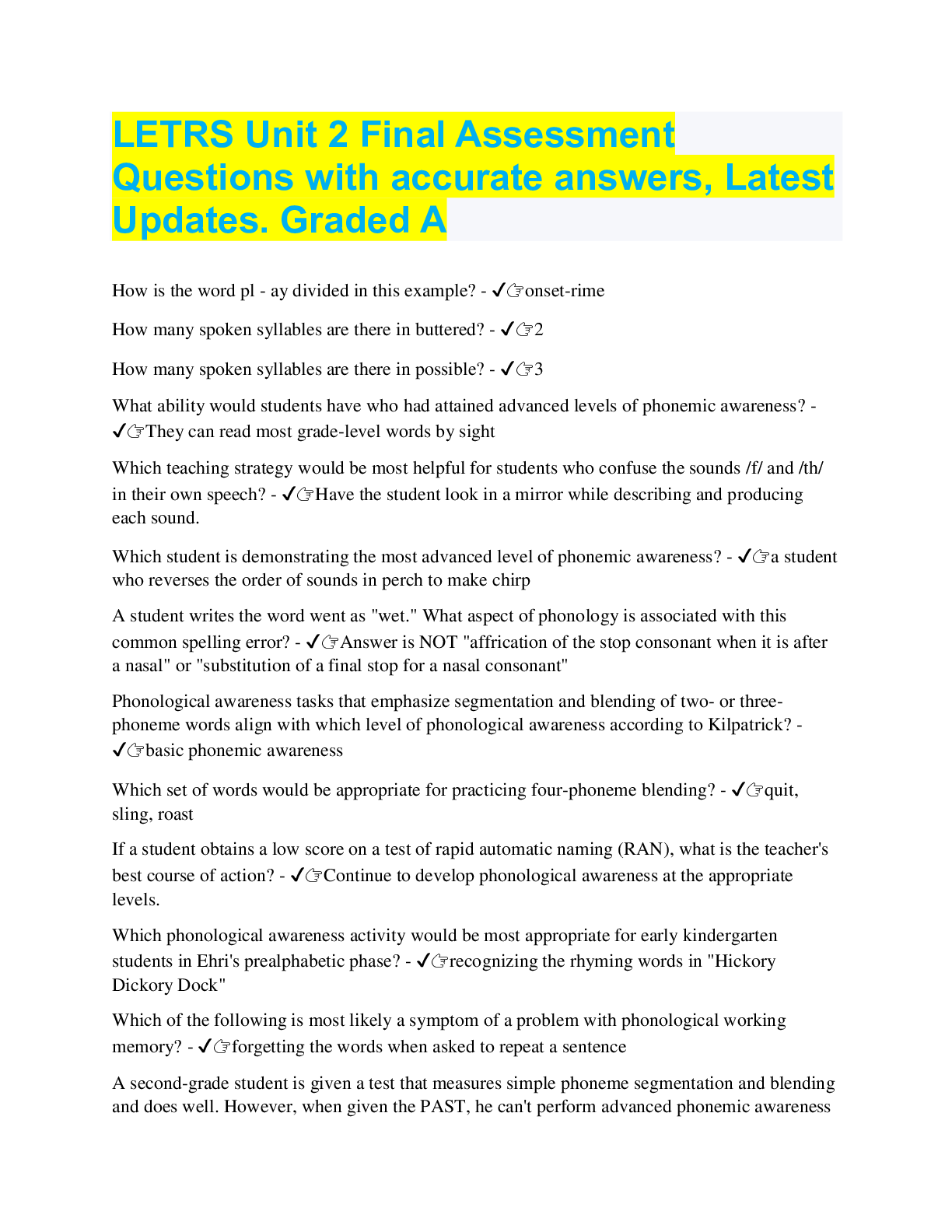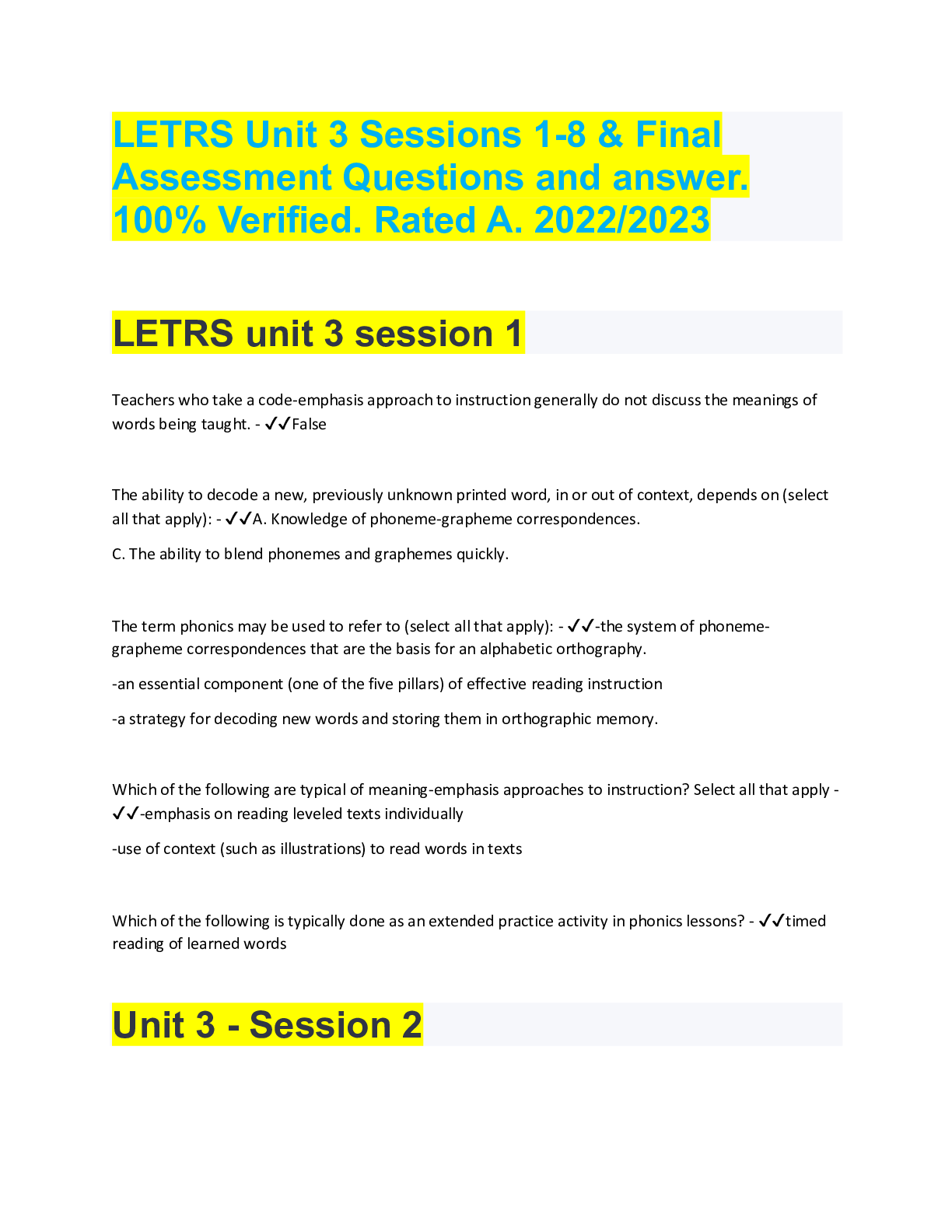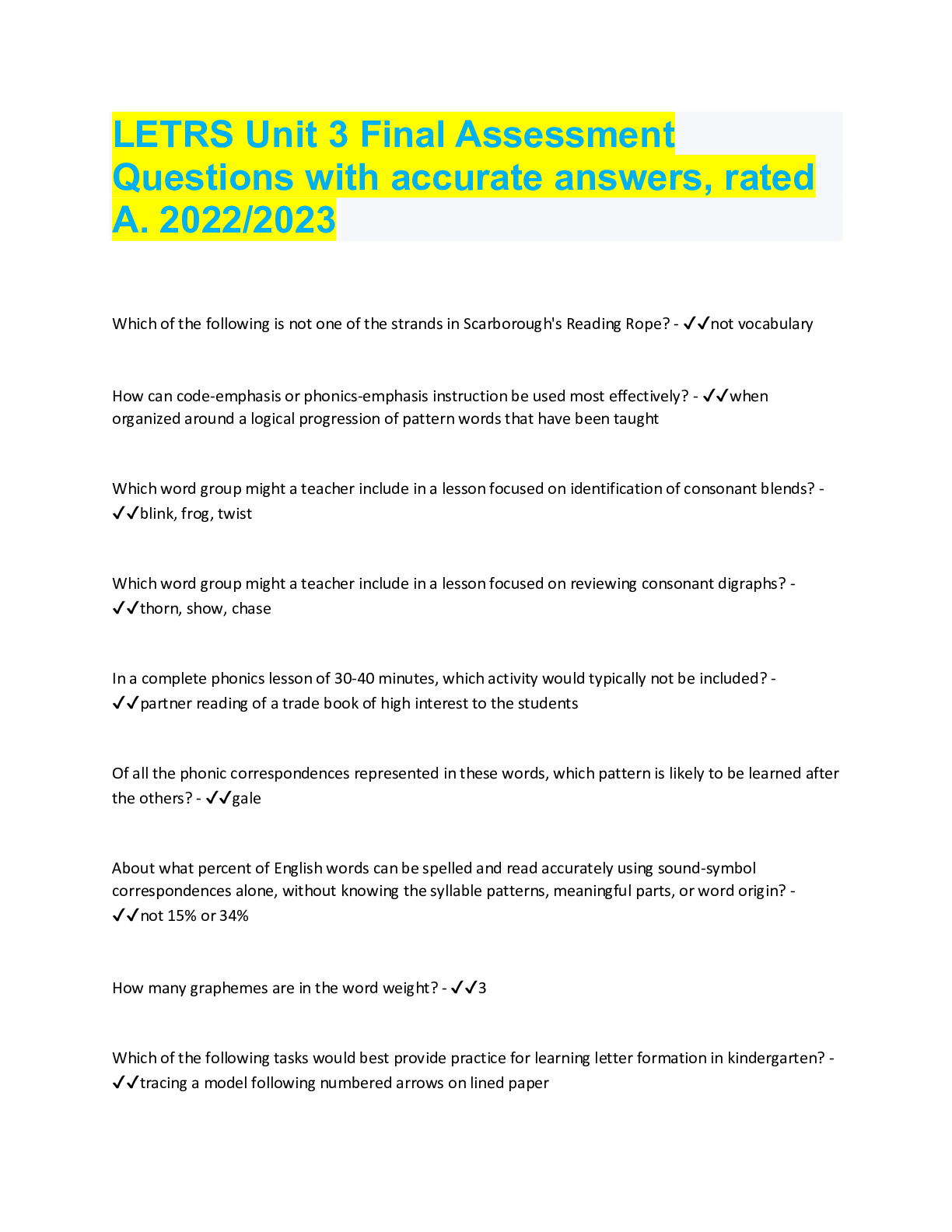Psychology > QUESTIONS & ANSWERS > Louisiana State University, Eunice - SOCL 2001 Sociology Chapter 9 (Question and Answers) 95% correc (All)
Louisiana State University, Eunice - SOCL 2001 Sociology Chapter 9 (Question and Answers) 95% correct
Document Content and Description Below
Louisiana State University, Eunice - SOCL 2001 Sociology Chapter 9 (Question and Answers) 95% correct Question 1 Marks: 1 The Acme Corporation has adopted "Tiny Brothers" as a means of contro... lling employees. What is a "Tiny Brother"? Choose one answer. a. a computer spyware program b. a corporate spy c. a security camera d. a security officer Correct Marks for this submission: 1/1. Question 2 Marks: 1 Mahatma is a member of India's Brahman caste. What is Mahatma's most likely occupation? Choose one answer. a. a water boy b. a general in the army c. a skilled painter d. a Hindu priest Correct Marks for this submission: 1/1. Question 3 Marks: 1 Raul is a member of the Kshatriya who recently engaged in an intimate act with a member of the Dalit. Raul has seen the error of his ways, however, and wants to make amends for his indiscretions. Which statement best explains Raul's next course of action? Choose one answer. a. Raul will sacrifice his most prized oxen or goats to the gods. b. Raul will commit become an indentured servant. c. Raul will seek the forgiveness of twelve reputable men in his community. d. Raul will undergo ablution. correct Marks for this submission: 0/1. Question 4 Marks: 1 The division of large numbers of people into layers according to their relative power, property, and prestige is referred to as ________. Choose one answer. a. the diversification of society b. social networking c. multiculturalism d. social stratification Correct Marks for this submission: 1/1. Question 5 Marks: 1 In colonial America, immigrants were transported to the new world "on credit" by the captain of the ship, who then sold their services to wealthy colonists who paid their passage. In return, these immigrants worked for a specified period of time and were known as ________ or ________. Choose one answer. a. jati; untouchables b. probationers; manservants c. colonial slaves; domestic workers d. indentured servants; bonded laborers Correct Marks for this submission: 1/1. Question 6 Marks: 1 Which two theorists concluded that the universality of stratification can be explained by the necessity to motivate the most qualified people to fill the most important and demanding positions in a society? Choose one answer. a. Kingsley Davis and Wilbert Moore b. Karl Marx and Frederick Engels c. Max Weber and Emile Durkheim d. Richard Cloward and Lloyd Ohlin Correct Marks for this submission: 1/1. Question 7 Marks: 1 In some societies, closely related members of the ruling class and the upper class marry to preserve their power and wealth within their families. This is a practice known as ________. Choose one answer. a. apartheid b. ritual pollution c. indentured service d. endogamy Correct Marks for this submission: 1/1. Question 8 Marks: 1 In the estate system, the practice of the firstborn son inheriting all land owned by the father was called ________. Choose one answer. a. endogamy b. primogeniture c. bourgeoisie d. ablution Correct Marks for this submission: 1/1. Question 9 Marks: 1 What is the major means of control used by the neocolonialists to maintain global stratification? Choose one answer. a. controlling the country's mass media b. creating debt along with ever-mounting interest c. bribing the country's government officials d. using military occupation as a form of coercion Correct Marks for this submission: 1/1. Question 10 Marks: 1 Why do the ruling elite in the Least Industrialized Nations work so closely with the heads of multinational corporations to develop informal partnerships? Choose one answer. a. to increase the standard of living of people in poor nations b. to increase humanitarian aid to the poor c. to develop the necessary political stability to maintain the partnership d. to expand the middle class throughout Least Industrialized Nations correct Marks for this submission: 0/1. Question 11 Marks: 1 According to Melvin Tumin, which of the following high school seniors will most likely attend college? Choose one answer. a. the A- student from a decaying urban slum b. the C+ student from the upper class c. the student who scored the mean on the college entrance exam d. the promising student in need of financial aid Correct Marks for this submission: 1/1. Question 12 Marks: 1 What were the three major causes of slavery prior to life in the American colonies? Choose one answer. a. debt, crime, and war b. gender, racism, and social class c. gender, politics, and ethnicity d. racism, religion, and gender Correct Marks for this submission: 1/1. Question 13 Marks: 1 The ability to control others, even over their objections, is referred to as ________. Choose one answer. a. status b. prestige c. class d. power Correct Marks for this submission: 1/1. Question 14 Marks: 1 What is the basis of India's caste system? Choose one answer. a. religion b. education c. ethnicity d. race Correct Marks for this submission: 1/1. Question 15 Marks: 1 Multinational corporations often funnel money to elites in the Least Industrialized Nations to create a "favorable business climate." In reality, this term refers to the creation of ________ and ________. Choose one answer. a. open markets; long-term leases b. government subsidies; massive workforces c. open markets; low taxes d. low taxes; cheap labor Correct Marks for this submission: 1/1. Question 16 Marks: 1 In Great Britain, what percentage of the population makes up the elite upper class? Choose one answer. a. 1 percent b. 4 percent c. 11 percent d. 18 percent Correct Marks for this submission: 1/1. Question 17 Marks: 1 Bartholomew is a member of the second estate in Europe during the middle ages. In view of this, what is Bartholomew's most likely social location? Choose one answer. a. He is a peasant working on a large plantation. b. He is the appointed ruler of Sherwood Forest. c. He is a monk in the St. Thomas Aquinas parish. d. He is a general in the army. Correct Marks for this submission: 1/1. Question 18 Marks: 1 Sally is employed as a computer programmer for the Ellis Corporation. She has a savings account of $15,000 and owns a few shares of Ellis stock. She thinks of herself as an investor rather than as a worker. Marx would maintain that Sally has experienced ________. Choose one answer. a. false class consciousness b. class consciousness c. misplaced commitment d. management ideology Correct Marks for this submission: 1/1. Question 19 Marks: 1 John Kenneth Galbraith's theory of global stratification, referred to as a culture of poverty, is based on a concept first proposed by ________. Choose one answer. a. John Hanaway b. Frank Tannenbaun c. William Ogden d. Oscar Lewis Correct Marks for this submission: 1/1. Question 20 Marks: 1 What is the significant difference between the class system and the systems of slavery, caste, and estate? Choose one answer. a. The class system has fluid boundaries. b. The class system works in democracies. c. The class system existed before the other three. d. The class system is not based on religion. Correct Marks for this submission: 1/1. Question 21 Marks: 1 Two countries previously classified as Least Industrialized Nations that are building strong competition with Western nations because of cheap telecommunications and outsourced jobs from multinational corporations are ________ and ________. Choose one answer. a. China; India b. Indonesia; Taiwan c. Japan; Brazil d. Vietnam; Indonesia Correct Marks for this submission: 1/1. Question 22 Marks: 1 The sociologist who believed that social class is made up of three components - property, power, and prestige - was ________. Choose one answer. a. Max Weber b. Talcott Parsons c. Karl Marx d. Lewis Coser Jr. Correct Marks for this submission: 1/1. Question 23 Marks: 1 In world system theory, nations that have been totally left out of the development of capitalism and allowed to stagnate are called ________. Choose one answer. a. periphery nations b. core nations c. the external area d. semiperiphery nations Correct Marks for this submission: 1/1. Question 24 Marks: 1 Where would someone encounter a stratification system that includes Europeans, Africans, Coloureds, and Asians? Choose one answer. a. Iran b. Brazil c. South Africa d. Congo Correct Marks for this submission: 1/1. Question 25 Marks: 1 In which of the following societies might slavery most likely exist? Choose one answer. a. the hunting and gathering society b. the agricultural society c. the pastoral society d. the industrial society Correct Marks for this submission: 1/1. Question 26 Marks: 1 At the steel plant, all minorities hired are assigned to work the battery pits, one of the dirtiest jobs in the mill. Even so, the battery pit workers wear this assignment as a badge of honor and have developed a close social bond that transcends the time they spend at the mill. How would Karl Marx describe their solidarity? Choose one answer. a. The workers are experiencing false class consciousness. b. The workers are victims of social stratification. c. The workers share class consciousness. d. The workers' sense of fairness has been influenced by primogeniture. Correct Marks for this submission: 1/1. Question 27 Marks: 1 The spread of an economic system based on investing to make profits, which is becoming the world's dominant economic system, is referred to as ________. Choose one answer. a. the periphery of nations b. the globalization of capitalism c. the economic colonization d. the capitalization of the world economy Correct Marks for this submission: 1/1. Question 28 Marks: 1 Based on the global stratification model, nations of the former Soviet Union and its former satellites in Eastern Europe are classified as ________. Choose one answer. a. the Industrializing Nations b. the Least Industrialized Nations c. the Most Industrialized Nations d. the Third World Nations Correct Marks for this submission: 1/1. Question 29 Marks: 1 What is the primary way by which the British maintain their class system from one generation to the next? Choose one answer. a. religious doctrine b. educational achievement c. racial and ethnic background d. occupational placement Correct Marks for this submission: 1/1. Question 30 Marks: 1 What was the purpose of colonialism as it was practiced by the major European powers during eighteenth, nineteenth, and twentieth centuries? Choose one answer. a. to establish a protectorate to preserve the annexed nation's freedom b. to form limited partnerships with the annexed nation c. to exploit the annexed nation's people and resources d. to establish a new nation-state Correct ximum of 100 (63%) Question 1 Marks: 1 Of the following technologies, which does the government have the greatest difficulty controlling? Choose one answer. a. radio broadcasts b. books, magazines, and newspapers c. syndicated television news programs d. Internet communications and e-mails Correct Marks for this submission: 1/1. Question 2 Marks: 1 Bartholomew is a member of the second estate in Europe during the middle ages. In view of this, what is Bartholomew's most likely social location? Choose one answer. a. He is a general in the army. b. He is a peasant working on a large plantation. c. He is the appointed ruler of Sherwood Forest. d. He is a monk in the St. Thomas Aquinas parish. Incorrect Marks for this submission: 1/1. Question 3 Marks: 1 Which concept explains the rise of global stratification as including core nations, semiperiphery nations, periphery nations, and external areas? Choose one answer. a. neocolonialism b. colonialism c. world system theory d. culture of poverty Incorrect Marks for this submission: 1/1. Question 4 Marks: 1 Who or what are the "Asian Tigers"? Choose one answer. a. a Japanese baseball team that serves as a model for capitalism b. the neocolonialists who have exploited the rubber fields of Indonesia c. a group of Marxists opposed to capitalism developing in Southeast Asia d. the Pacific Rim nations that have a strong capitalist base correct Marks for this submission: 0/1. Question 5 Marks: 1 Some nations have traditionally been in poverty from one generation to the next, relying on tradition rather than experimenting with new technology that might improve their standard of living. This explanation for global stratification is called ________. Choose one answer. a. dependency theory b. world system theory c. theory of undeveloped nations d. culture of poverty Incorrect Marks for this submission: 0/1. Question 6 Marks: 1 Multinational corporations often funnel money to elites in the Least Industrialized Nations to create a "favorable business climate." In reality, this term refers to the creation of ________ and ________. Choose one answer. a. low taxes; cheap labor b. open markets; long-term leases c. government subsidies; massive workforces d. open markets; low taxes Incorrect Marks for this submission: 0/1. Question 7 Marks: 1 In which of the following societies might slavery most likely exist? Choose one answer. a. the industrial society b. the hunting and gathering society c. the pastoral society d. the agricultural society Correct Marks for this submission: 1/1. Question 8 Marks: 1 At the steel plant, all minorities hired are assigned to work the battery pits, one of the dirtiest jobs in the mill. Even so, the battery pit workers wear this assignment as a badge of honor and have developed a close social bond that transcends the time they spend at the mill. How would Karl Marx describe their solidarity? Choose one answer. a. The workers are victims of social stratification. b. The workers are experiencing false class consciousness. c. The workers share class consciousness. d. The workers' sense of fairness has been influenced by primogeniture. Incorrect Marks for this submission: 0/1. Question 9 Marks: 1 In Great Britain, what is a "public school"? Choose one answer. a. an exclusive private boarding school b. a neighborhood school within a specific village or town c. a school attended by children from all classes d. a school supported by the government Incorrect Marks for this submission: 0/1. Question 10 Marks: 1 What is the primary way by which the British maintain their class system from one generation to the next? Choose one answer. a. occupational placement b. educational achievement c. religious doctrine d. racial and ethnic background Correct Marks for this submission: 1/1. Question 11 Marks: 1 Of the following methods, which would be the best way to preserve a stratification system? Choose one answer. a. establishing a well-trained and highly armed police force b. allowing brute force and coercion to keep dissidents in their place c. demonstrating violation of law through public punishment d. controlling ideas, information, technology through ideology Correct Marks for this submission: 1/1. Question 12 Marks: 1 Based on the global stratification model, nations of the former Soviet Union and its former satellites in Eastern Europe are classified as ________. Choose one answer. a. the Industrializing Nations b. the Third World Nations c. the Most Industrialized Nations d. the Least Industrialized Nations Incorrect Marks for this submission: 0/1. Question 13 Marks: 1 What is the major means of control used by the neocolonialists to maintain global stratification? Choose one answer. a. controlling the country's mass media b. creating debt along with ever-mounting interest c. using military occupation as a form of coercion d. bribing the country's government officials Correct Marks for this submission: 1/1. Question 14 Marks: 1 In some societies, closely related members of the ruling class and the upper class marry to preserve their power and wealth within their families. This is a practice known as ________. Choose one answer. a. ritual pollution b. indentured service c. apartheid d. endogamy Correct Marks for this submission: 1/1. Question 15 Marks: 1 What is the basis of India's caste system? Choose one answer. a. religion b. education c. ethnicity d. race Correct Marks for this submission: 1/1. Question 16 Marks: 1 In the estate system, the practice of the firstborn son inheriting all land owned by the father was called ________. Choose one answer. a. endogamy b. ablution c. primogeniture d. bourgeoisie Correct Marks for this submission: 1/1. Question 17 Marks: 1 The ability to control others, even over their objections, is referred to as ________. Choose one answer. a. status b. power c. class d. prestige Correct Marks for this submission: 1/1. Question 18 Marks: 1 Why do the ruling elite in the Least Industrialized Nations work so closely with the heads of multinational corporations to develop informal partnerships? Choose one answer. a. to develop the necessary political stability to maintain the partnership b. to increase humanitarian aid to the poor c. to increase the standard of living of people in poor nations d. to expand the middle class throughout Least Industrialized Nations Incorrect Marks for this submission: 0/1. Question 19 Marks: 1 Mahatma is a member of India's Brahman caste. What is Mahatma's most likely occupation? Choose one answer. a. a water boy b. a Hindu priest c. a general in the army d. a skilled painter Correct Marks for this submission: 1/1. Question 20 Marks: 1 The sociologist who believed that social class is made up of three components - property, power, and prestige - was ________. Choose one answer. a. Lewis Coser Jr. b. Talcott Parsons c. Karl Marx d. Max Weber Correct Marks for this submission: 1/1. Question 21 Marks: 1 What were the three major causes of slavery prior to life in the American colonies? Choose one answer. a. gender, politics, and ethnicity b. gender, racism, and social class c. racism, religion, and gender d. debt, crime, and war Correct Marks for this submission: 1/1. Question 22 Marks: 1 The spread of an economic system based on investing to make profits, which is becoming the world's dominant economic system, is referred to as ________. Choose one answer. a. the capitalization of the world economy b. the periphery of nations c. the globalization of capitalism d. the economic colonization Correct Marks for this submission: 1/1. Question 23 Marks: 1 In his book, The Ruling Class, GaetanoMosca offered three arguments regarding society and power. All of the following represent his arguments EXCEPT for which one? Choose one answer. a. Leadership means an inequality of power. b. Human nature is self-centered. c. No society can exist unless it is organized. d. Man is naturally good. Incorrect Marks for this submission: 0/1. Question 24 Marks: 1 What was the purpose of colonialism as it was practiced by the major European powers during eighteenth, nineteenth, and twentieth centuries? Choose one answer. a. to exploit the annexed nation's people and resources b. to form limited partnerships with the annexed nation c. to establish a new nation-state d. to establish a protectorate to preserve the annexed nation's freedom Correct Marks for this submission: 1/1. Question 25 Marks: 1 Which American sociologist described the years of American colonial slavery when he said that "gradually the entire white South became an armed camp to keep Negroes in slavery and to kill the black rebel"? Choose one answer. a. Booker T. Washington b. W. E. B. Du Bois c. George Washington Carver d. Benjamin Quarles Correct Marks for this submission: 1/1. Question 26 Marks: 1 Raul is a member of the Kshatriya who recently engaged in an intimate act with a member of the Dalit. Raul has seen the error of his ways, however, and wants to make amends for his indiscretions. Which statement best explains Raul's next course of action? Choose one answer. a. Raul will sacrifice his most prized oxen or goats to the gods. b. Raul will seek the forgiveness of twelve reputable men in his community. c. Raul will commit become an indentured servant. d. Raul will undergo ablution. Incorrect Marks for this submission: 0/1. Question 27 Marks: 1 According to Melvin Tumin, which of the following high school seniors will most likely attend college? Choose one answer. a. the A- student from a decaying urban slum b. the C+ student from the upper class c. the promising student in need of financial aid d. the student who scored the mean on the college entrance exam Correct Marks for this submission: 1/1. Question 28 Marks: 1 In world system theory, nations that have been totally left out of the development of capitalism and allowed to stagnate are called ________. Choose one answer. a. periphery nations b. the external area c. core nations d. semiperiphery nations Correct Marks for this submission: 1/1. Question 29 Marks: 1 What did Karl Marx predict after workers were exploited year after year by the capitalist class? Choose one answer. a. A strong middle class would emerge. b. The capitalist society would synthesize into a classless society. c. Workers would abandon their jobs, unionize, and gain the power to negotiate. d. Workers would revolt against the bourgeoisie and assume control. Correct Marks for this submission: 1/1. Question 30 Marks: 1 In every society, from the hunting and gathering society to the postindustrial society, the most common basis for social stratification has been ________. Choose one answer. a. education b. race c. gender d. income Correct Marks for this submission: 1/1. t of a maximum of 100 (63%) Question 1 Marks: 1 Of the following technologies, which does the government have the greatest difficulty controlling? Choose one answer. a. radio broadcasts b. books, magazines, and newspapers c. syndicated television news programs d. Internet communications and e-mails Correct Marks for this submission: 1/1. Question 2 Marks: 1 Bartholomew is a member of the second estate in Europe during the middle ages. In view of this, what is Bartholomew's most likely social location? Choose one answer. a. He is a general in the army. b. He is a peasant working on a large plantation. c. He is the appointed ruler of Sherwood Forest. d. He is a monk in the St. Thomas Aquinas parish. Incorrect Marks for this submission: 0/1. Question 3 Marks: 1 Which concept explains the rise of global stratification as including core nations, semiperiphery nations, periphery nations, and external areas? Choose one answer. a. neocolonialism b. colonialism c. world system theory d. culture of poverty Incorrect Marks for this submission: 0/1. Question 4 Marks: 1 Who or what are the "Asian Tigers"? Choose one answer. a. a Japanese baseball team that serves as a model for capitalism b. the neocolonialists who have exploited the rubber fields of Indonesia c. a group of Marxists opposed to capitalism developing in Southeast Asia d. the Pacific Rim nations that have a strong capitalist base Incorrect Marks for this submission: 0/1. Question 5 Marks: 1 Some nations have traditionally been in poverty from one generation to the next, relying on tradition rather than experimenting with new technology that might improve their standard of living. This explanation for global stratification is called ________. Choose one answer. a. dependency theory b. world system theory c. theory of undeveloped nations d. culture of poverty Incorrect Marks for this submission: 0/1. Question 6 Marks: 1 Multinational corporations often funnel money to elites in the Least Industrialized Nations to create a "favorable business climate." In reality, this term refers to the creation of ________ and ________. Choose one answer. a. low taxes; cheap labor b. open markets; long-term leases c. government subsidies; massive workforces d. open markets; low taxes Incorrect Marks for this submission: 0/1. Question 7 Marks: 1 In which of the following societies might slavery most likely exist? Choose one answer. a. the industrial society b. the hunting and gathering society c. the pastoral society d. the agricultural society Correct Marks for this submission: 1/1. Question 8 Marks: 1 At the steel plant, all minorities hired are assigned to work the battery pits, one of the dirtiest jobs in the mill. Even so, the battery pit workers wear this assignment as a badge of honor and have developed a close social bond that transcends the time they spend at the mill. How would Karl Marx describe their solidarity? Choose one answer. a. The workers are victims of social stratification. b. The workers are experiencing false class consciousness. c. The workers share class consciousness. d. The workers' sense of fairness has been influenced by primogeniture. Incorrect Marks for this submission: 0/1. Question 9 Marks: 1 In Great Britain, what is a "public school"? Choose one answer. a. an exclusive private boarding school b. a neighborhood school within a specific village or town c. a school attended by children from all classes d. a school supported by the government Incorrect Marks for this submission: 0/1. Question 10 Marks: 1 What is the primary way by which the British maintain their class system from one generation to the next? Choose one answer. a. occupational placement b. educational achievement c. religious doctrine d. racial and ethnic background Correct Marks for this submission: 1/1. Question 11 Marks: 1 Of the following methods, which would be the best way to preserve a stratification system? Choose one answer. a. establishing a well-trained and highly armed police force b. allowing brute force and coercion to keep dissidents in their place c. demonstrating violation of law through public punishment d. controlling ideas, information, technology through ideology Correct Marks for this submission: 1/1. Question 12 Marks: 1 Based on the global stratification model, nations of the former Soviet Union and its former satellites in Eastern Europe are classified as ________. Choose one answer. a. the Industrializing Nations b. the Third World Nations c. the Most Industrialized Nations d. the Least Industrialized Nations Incorrect Marks for this submission: 0/1. Question 13 Marks: 1 What is the major means of control used by the neocolonialists to maintain global stratification? Choose one answer. a. controlling the country's mass media b. creating debt along with ever-mounting interest c. using military occupation as a form of coercion d. bribing the country's government officials Correct Marks for this submission: 1/1. Question 14 Marks: 1 In some societies, closely related members of the ruling class and the upper class marry to preserve their power and wealth within their families. This is a practice known as ________. Choose one answer. a. ritual pollution b. indentured service c. apartheid d. endogamy Correct Marks for this submission: 1/1. Question 15 Marks: 1 What is the basis of India's caste system? Choose one answer. a. religion b. education c. ethnicity d. race Correct Marks for this submission: 1/1. Question 16 Marks: 1 In the estate system, the practice of the firstborn son inheriting all land owned by the father was called ________. Choose one answer. a. endogamy b. ablution c. primogeniture d. bourgeoisie Correct Marks for this submission: 1/1. Question 17 Marks: 1 The ability to control others, even over their objections, is referred to as ________. Choose one answer. a. status b. power c. class d. prestige Correct Marks for this submission: 1/1. Question 18 Marks: 1 Why do the ruling elite in the Least Industrialized Nations work so closely with the heads of multinational corporations to develop informal partnerships? Choose one answer. a. to develop the necessary political stability to maintain the partnership b. to increase humanitarian aid to the poor c. to increase the standard of living of people in poor nations d. to expand the middle class throughout Least Industrialized Nations Incorrect Marks for this submission: 0/1. Question 19 Marks: 1 Mahatma is a member of India's Brahman caste. What is Mahatma's most likely occupation? Choose one answer. a. a water boy b. a Hindu priest c. a general in the army d. a skilled painter Correct Marks for this submission: 1/1. Question 20 Marks: 1 The sociologist who believed that social class is made up of three components - property, power, and prestige - was ________. Choose one answer. a. Lewis Coser Jr. b. Talcott Parsons c. Karl Marx d. Max Weber Correct Marks for this submission: 1/1. Question 21 Marks: 1 What were the three major causes of slavery prior to life in the American colonies? Choose one answer. a. gender, politics, and ethnicity b. gender, racism, and social class c. racism, religion, and gender d. debt, crime, and war Correct Marks for this submission: 1/1. Question 22 Marks: 1 The spread of an economic system based on investing to make profits, which is becoming the world's dominant economic system, is referred to as ________. Choose one answer. a. the capitalization of the world economy b. the periphery of nations c. the globalization of capitalism d. the economic colonization Correct Marks for this submission: 1/1. Question 23 Marks: 1 In his book, The Ruling Class, GaetanoMosca offered three arguments regarding society and power. All of the following represent his arguments EXCEPT for which one? Choose one answer. a. Leadership means an inequality of power. b. Human nature is self-centered. c. No society can exist unless it is organized. d. Man is naturally good. Incorrect Marks for this submission: 0/1. Question 24 Marks: 1 What was the purpose of colonialism as it was practiced by the major European powers during eighteenth, nineteenth, and twentieth centuries? Choose one answer. a. to exploit the annexed nation's people and resources b. to form limited partnerships with the annexed nation c. to establish a new nation-state d. to establish a protectorate to preserve the annexed nation's freedom Correct Marks for this submission: 1/1. Question 25 Marks: 1 Which American sociologist described the years of American colonial slavery when he said that "gradually the entire white South became an armed camp to keep Negroes in slavery and to kill the black rebel"? Choose one answer. a. Booker T. Washington b. W. E. B. Du Bois c. George Washington Carver d. Benjamin Quarles Correct Marks for this submission: 1/1. Question 26 Marks: 1 Raul is a member of the Kshatriya who recently engaged in an intimate act with a member of the Dalit. Raul has seen the error of his ways, however, and wants to make amends for his indiscretions. Which statement best explains Raul's next course of action? Choose one answer. a. Raul will sacrifice his most prized oxen or goats to the gods. b. Raul will seek the forgiveness of twelve reputable men in his community. c. Raul will commit become an indentured servant. d. Raul will undergo ablution. Incorrect Marks for this submission: 0/1. Question 27 Marks: 1 According to Melvin Tumin, which of the following high school seniors will most likely attend college? Choose one answer. a. the A- student from a decaying urban slum b. the C+ student from the upper class c. the promising student in need of financial aid d. the student who scored the mean on the college entrance exam Correct Marks for this submission: 1/1. Question 28 Marks: 1 In world system theory, nations that have been totally left out of the development of capitalism and allowed to stagnate are called ________. Choose one answer. a. periphery nations b. the external area c. core nations d. semiperiphery nations Correct Marks for this submission: 1/1. Question 29 Marks: 1 What did Karl Marx predict after workers were exploited year after year by the capitalist class? Choose one answer. a. A strong middle class would emerge. b. The capitalist society would synthesize into a classless society. c. Workers would abandon their jobs, unionize, and gain the power to negotiate. d. Workers would revolt against the bourgeoisie and assume control. Correct Marks for this submission: 1/1. Question 30 Marks: 1 In every society, from the hunting and gathering society to the postindustrial society, the most common basis for social stratification has been ________. Choose one answer. a. education b. race c. gender d. income Correct Marks for this submission: 1/1. In some societies, closely related members of the ruling class and the upper class marry to preserve their power and wealth within their families. This is a practice known as ________. Choose one answer. a. endogamy b. indentured service c. apartheid d. ritual pollution Correct Marks for this submission: 1/1. Question 2 Marks: 1 Which concept explains the rise of global stratification as including core nations, semiperiphery nations, periphery nations, and external areas? Choose one answer. a. world system theory b. culture of poverty c. colonialism d. neocolonialism Correct Marks for this submission: 1/1. Question 3 Marks: 1 The sociologist who believed that social class is made up of three components - property, power, and prestige - was ________. Choose one answer. a. Lewis Coser Jr. b. Max Weber c. Karl Marx d. Talcott Parsons Correct Marks for this submission: 1/1. Question 4 Marks: 1 In the estate system, the practice of the firstborn son inheriting all land owned by the father was called ________. Choose one answer. a. endogamy b. bourgeoisie c. primogeniture d. ablution Correct Marks for this submission: 1/1. Question 5 Marks: 1 In his book, The Ruling Class, GaetanoMosca offered three arguments regarding society and power. All of the following represent his arguments EXCEPT for which one? Choose one answer. a. Man is naturally good. b. Human nature is self-centered. c. Leadership means an inequality of power. d. No society can exist unless it is organized. Correct Marks for this submission: 1/1. Question 6 Marks: 1 The Acme Corporation has adopted "Tiny Brothers" as a means of controlling employees. What is a "Tiny Brother"? Choose one answer. a. a security officer b. a corporate spy c. a computer spyware program d. a security camera Correct Marks for this submission: 1/1. Question 7 Marks: 1 Great Britain was one of the first nations in which industrial capitalism developed. According to world system theory, Great Britain would be a ________ nation. Choose one answer. a. Most Industrialized b. core c. semiperiphery d. periphery Correct Marks for this submission: 1/1. Question 8 Marks: 1 What is the basis of India's caste system? Choose one answer. a. religion b. education c. race d. ethnicity Correct Marks for this submission: 1/1. Question 9 Marks: 1 What was the purpose of colonialism as it was practiced by the major European powers during eighteenth, nineteenth, and twentieth centuries? Choose one answer. a. to exploit the annexed nation's people and resources b. to form limited partnerships with the annexed nation c. to establish a new nation-state d. to establish a protectorate to preserve the annexed nation's freedom Correct Marks for this submission: 1/1. Question 10 Marks: 1 A system of beliefs that justifies a particular social arrangement, such as slavery, is called ________. Choose one answer. a. class consciousness b. a caste system c. an ideology d. a constitution Correct Marks for this submission: 1/1. Question 11 Marks: 1 In colonial America, immigrants were transported to the new world "on credit" by the captain of the ship, who then sold their services to wealthy colonists who paid their passage. In return, these immigrants worked for a specified period of time and were known as ________ or ________. Choose one answer. a. indentured servants; bonded laborers b. probationers; manservants c. colonial slaves; domestic workers d. jati; untouchables Correct Marks for this submission: 1/1. Question 12 Marks: 1 Who or what are the "Asian Tigers"? Choose one answer. a. a Japanese baseball team that serves as a model for capitalism b. the Pacific Rim nations that have a strong capitalist base c. a group of Marxists opposed to capitalism developing in Southeast Asia d. the neocolonialists who have exploited the rubber fields of Indonesia Correct Marks for this submission: 1/1. Question 13 Marks: 1 What term would Karl Marx use for today's workers who mistakenly identify with the capitalists simply because they own a few shares of stock or work as managers of large corporations? Choose one answer. a. false class consciousness b. class improvisation c. social solidarity d. social bond Correct Marks for this submission: 1/1. Question 14 Marks: 1 Why do the ruling elite in the Least Industrialized Nations work so closely with the heads of multinational corporations to develop informal partnerships? Choose one answer. a. to increase the standard of living of people in poor nations b. to increase humanitarian aid to the poor c. to expand the middle class throughout Least Industrialized Nations d. to develop the necessary political stability to maintain the partnership Correct Marks for this submission: 1/1. Question 15 Marks: 1 What were the three major causes of slavery prior to life in the American colonies? Choose one answer. a. gender, politics, and ethnicity b. racism, religion, and gender c. gender, racism, and social class d. debt, crime, and war Correct Marks for this submission: 1/1. Question 16 Marks: 1 In every society, from the hunting and gathering society to the postindustrial society, the most common basis for social stratification has been ________. Choose one answer. a. race b. education c. gender d. income Correct Marks for this submission: 1/1. Question 17 Marks: 1 Some nations have traditionally been in poverty from one generation to the next, relying on tradition rather than experimenting with new technology that might improve their standard of living. This explanation for global stratification is called ________. Choose one answer. a. theory of undeveloped nations b. dependency theory c. culture of poverty d. world system theory Correct Marks for this submission: 1/1. Question 18 Marks: 1 Which of the following nations fails to fit into the stratification typology of Most Industrialized Nations, Industrializing Nations, and Least Industrialized Nations? Choose one answer. a. South Africa b. Australia c. Russia d. Kuwait Correct Marks for this submission: 1/1. Question 19 Marks: 1 Which of the following led to the discontinuation of the terms "First World," "Second World," and "Third World" to describe global stratification? Choose one answer. a. the end of World War II b. the collapse of the Soviet Union. c. the emergence of the postindustrial society. d. the Industrial Revolution Correct Marks for this submission: 1/1. Question 20 Marks: 1 If a person were living during Karl Marx's lifetime and worked at the Smittertown ironworks, Marx would consider that person a member of the ________. Choose one answer. a. lumpenproletariat b. middle class c. bourgeoisie d. proletariat Correct Marks for this submission: 1/1. Question 21 Marks: 1 Which of the following characteristics is most associated with the class system? Choose one answer. a. enforced norms of endogamy b. class distinction for life based on ascription c. movement up and down the class ladder d. ownership of one group of people by another Correct Marks for this submission: 1/1. Question 22 Marks: 1 Who or what are the maquiladoras? Choose one answer. a. assembly-for-export factories along the Mexican border b. death squads that hunt and kill the beggar children of Brazil c. Mexican migrant workers who cross the border to pick crops in the U.S. d. elite members of Mexico's newly emerging industrial capitalists Correct Marks for this submission: 1/1. Question 23 Marks: 1 What is the primary way by which the British maintain their class system from one generation to the next? Choose one answer. a. occupational placement b. racial and ethnic background c. educational achievement d. religious doctrine Correct Marks for this submission: 1/1. Question 24 Marks: 1 Based on the global stratification model, nations of the former Soviet Union and its former satellites in Eastern Europe are classified as ________. Choose one answer. a. the Least Industrialized Nations b. the Most Industrialized Nations c. the Industrializing Nations d. the Third World Nations Correct Marks for this submission: 1/1. Question 25 Marks: 1 A form of the caste system that, until recently, was legal in South Africa was called ________. Choose one answer. a. endogamy b. slavery c. bonded labor d. apartheid Correct Marks for this submission: 1/1. Question 26 Marks: 1 Sally is employed as a computer programmer for the Ellis Corporation. She has a savings account of $15,000 and owns a few shares of Ellis stock. She thinks of herself as an investor rather than as a worker. Marx would maintain that Sally has experienced ________. Choose one answer. a. class consciousness b. misplaced commitment c. false class consciousness d. management ideology Correct Marks for this submission: 1/1. Question 27 Marks: 1 In world system theory, nations that have been totally left out of the development of capitalism and allowed to stagnate are called ________. Choose one answer. a. core nations b. semiperiphery nations c. the external area d. periphery nations Correct Marks for this submission: 1/1. Question 28 Marks: 1 In which of the following societies might slavery most likely exist? Choose one answer. a. the pastoral society b. the agricultural society c. the industrial society d. the hunting and gathering society Correct Marks for this submission: 1/1. Question 29 Marks: 1 What did Karl Marx predict after workers were exploited year after year by the capitalist class? Choose one answer. a. A strong middle class would emerge. b. Workers would abandon their jobs, unionize, and gain the power to negotiate. c. Workers would revolt against the bourgeoisie and assume control. d. The capitalist society would synthesize into a classless society. Correct Marks for this submission: 1/1. Question 30 Marks: 1 The spread of an economic system based on investing to make profits, which is becoming the world's dominant economic system, is referred to as ________. Choose one answer. a. the capitalization of the world economy b. the economic colonization c. the globalization of capitalism d. the periphery of nations Correct In Great Britain, what is a “public school”? >>an exclusive private boarding school<< **correct. Raul is a member of the Kshatriya who recently engaged in an intimate act with a member of the Dalit. Raul has seen the error of his ways, however, and wants to make amends for his indiscretions. Which statement best explains Raul’s next course of action? >>Raul will undergo ablution<< **correct. On what factor was the stratification system of the old Soviet Union based? >>inherited wealth<< **WRONG [Show More]
Last updated: 1 year ago
Preview 1 out of 35 pages
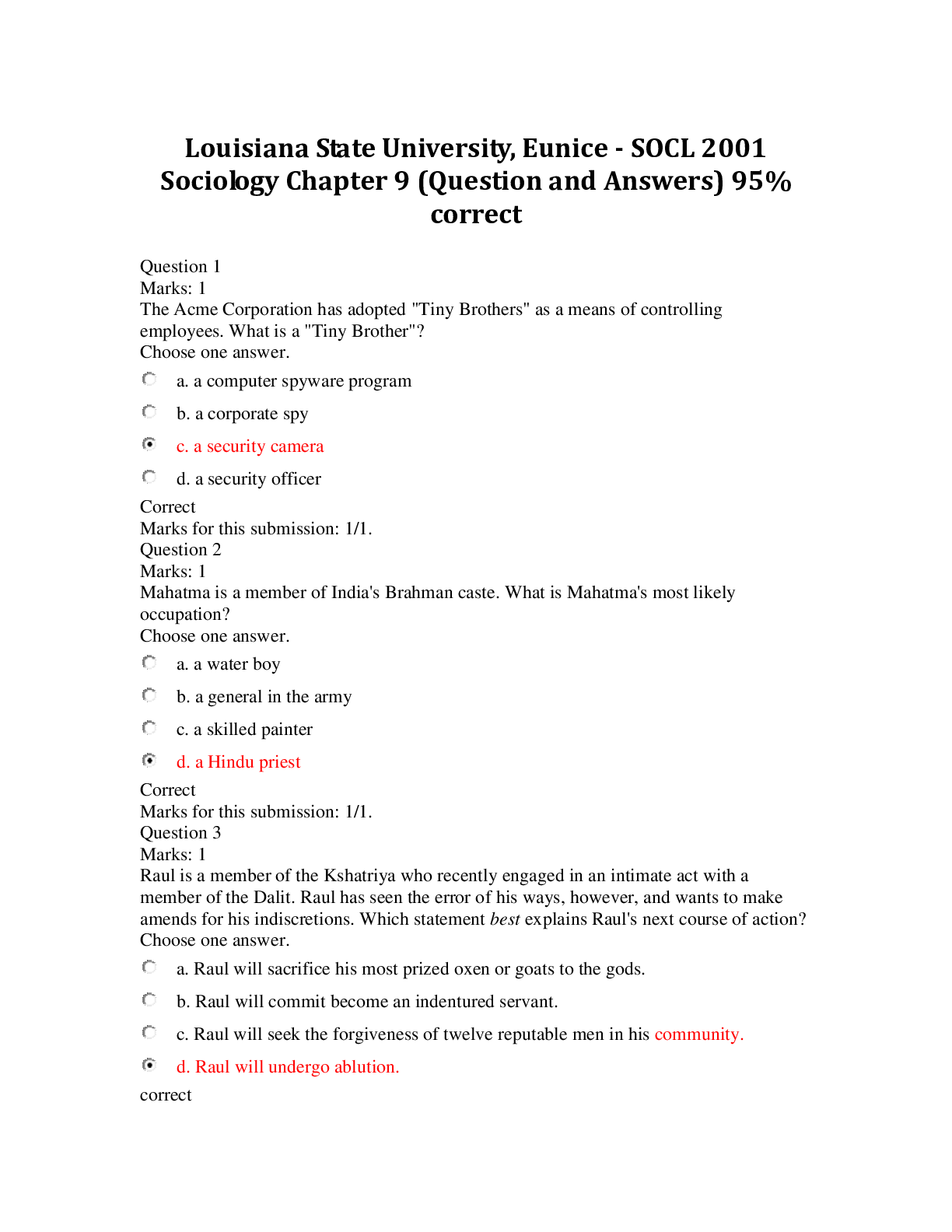
Reviews( 0 )
Document information
Connected school, study & course
About the document
Uploaded On
Apr 30, 2020
Number of pages
35
Written in
Additional information
This document has been written for:
Uploaded
Apr 30, 2020
Downloads
0
Views
40

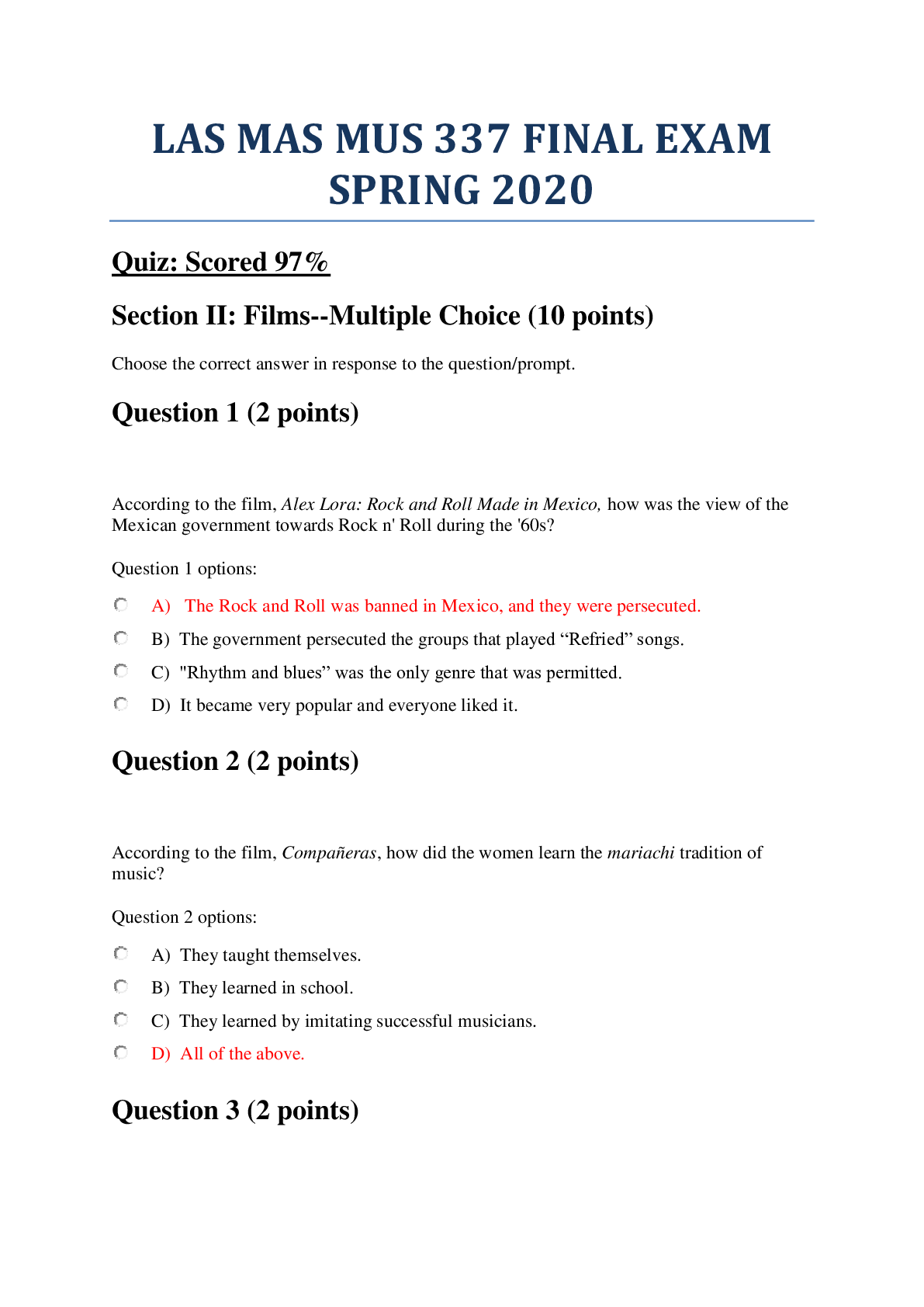
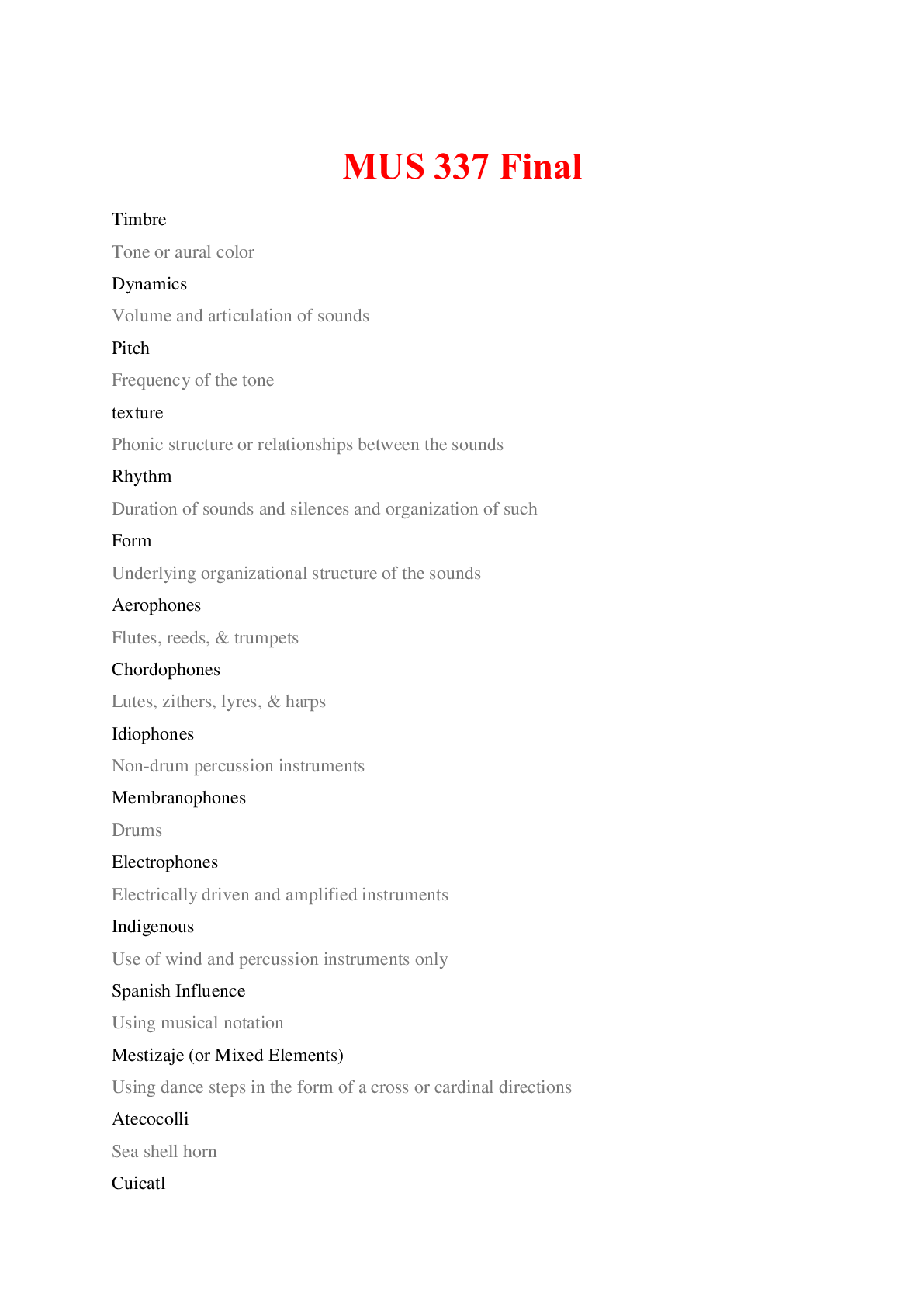
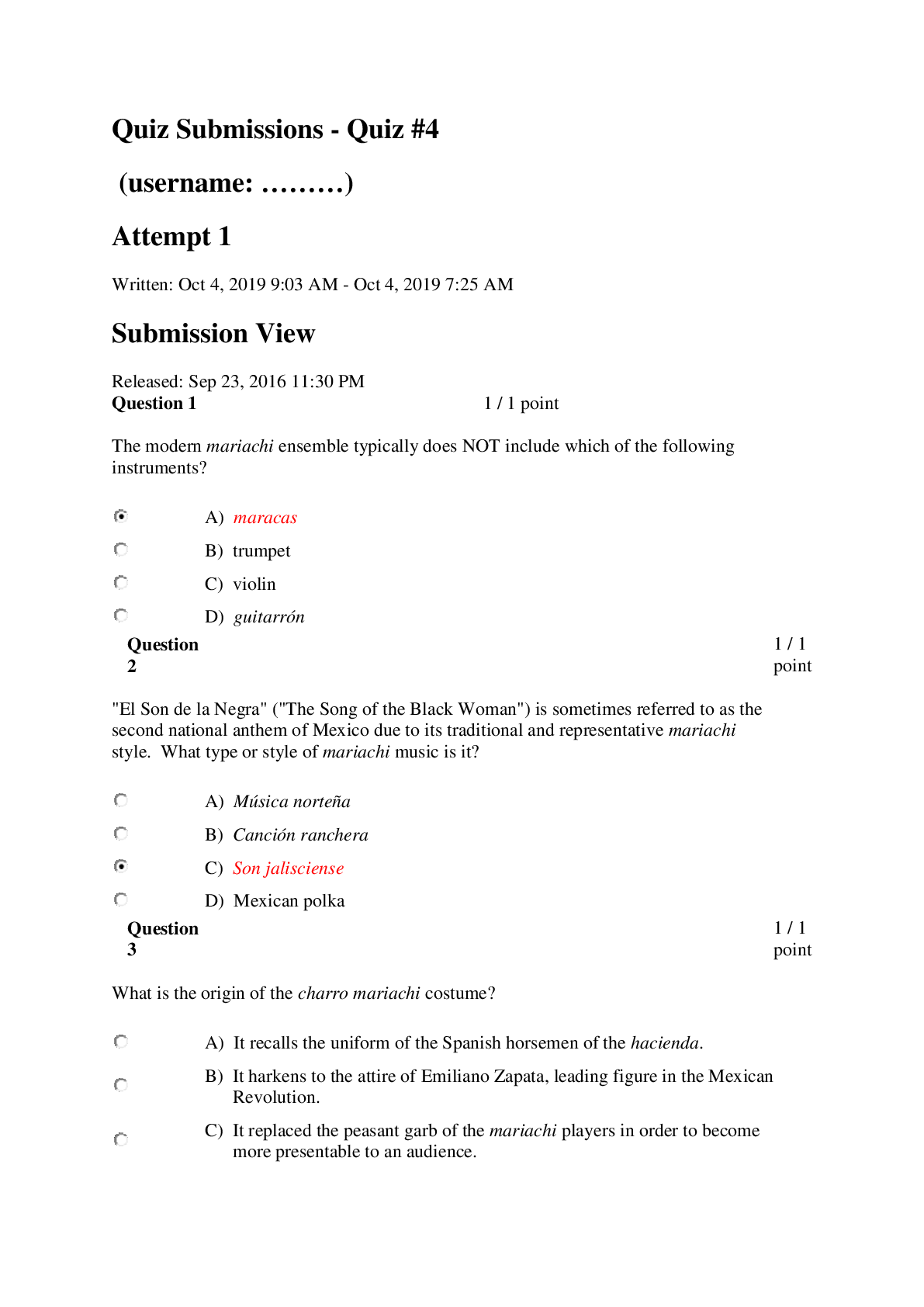
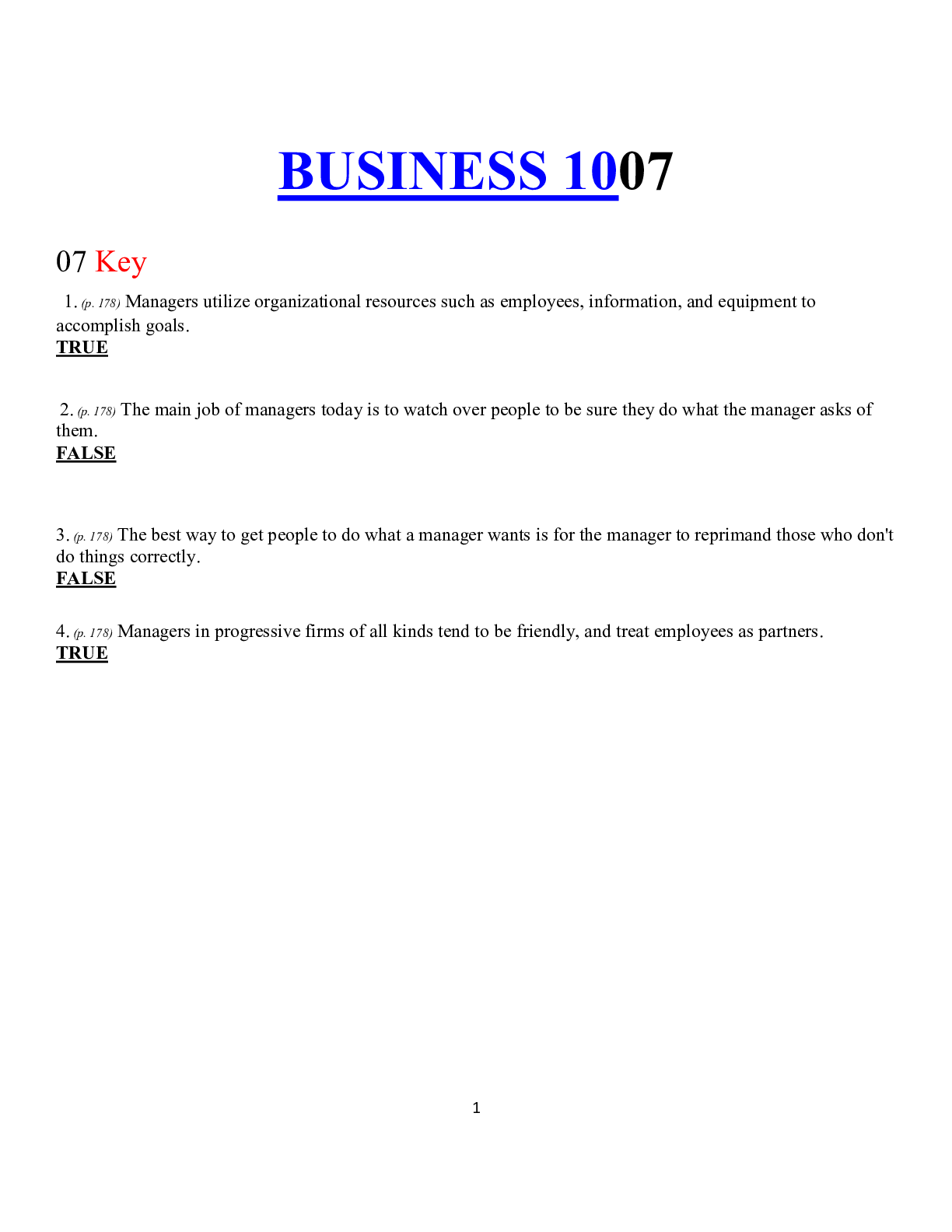
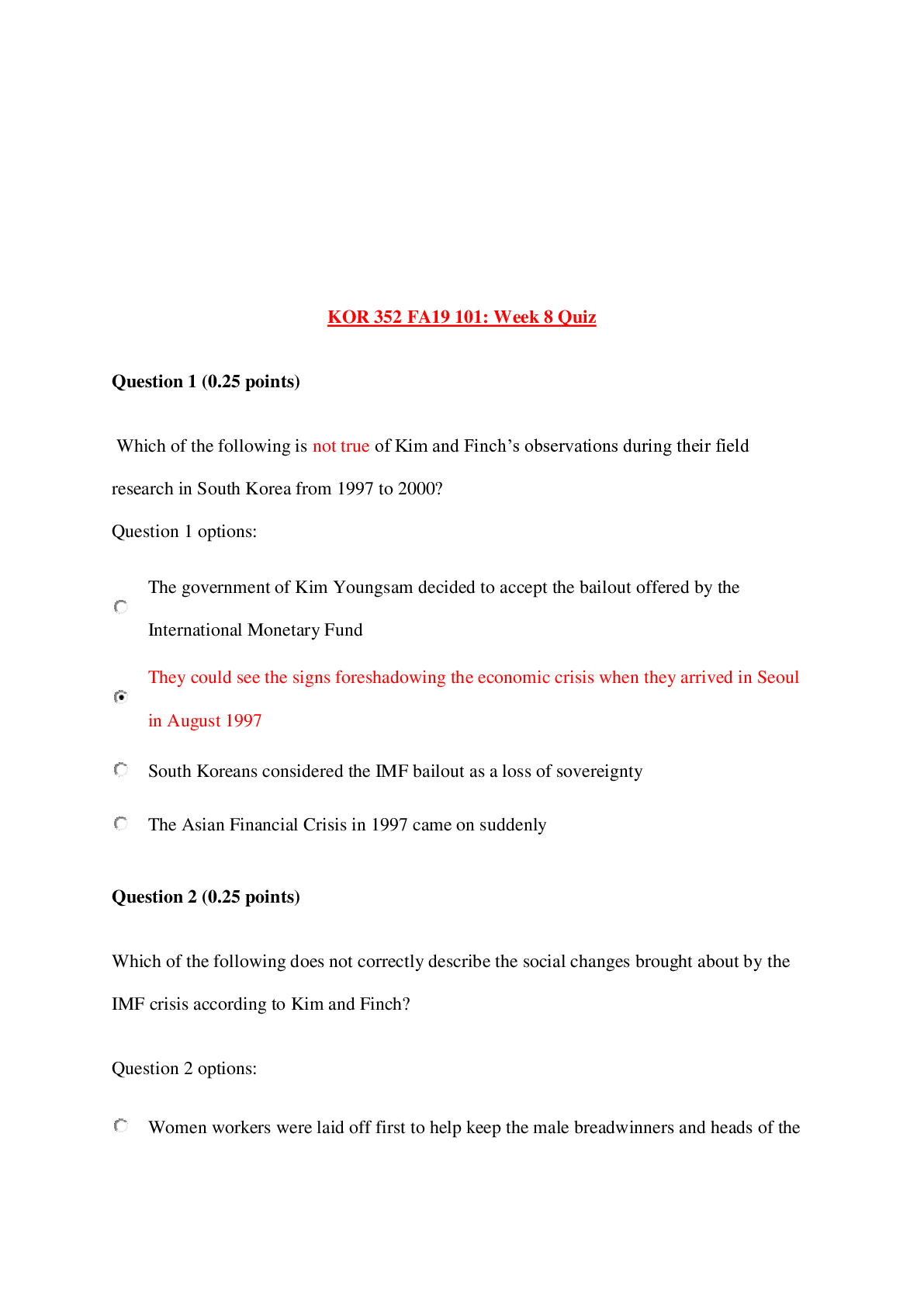
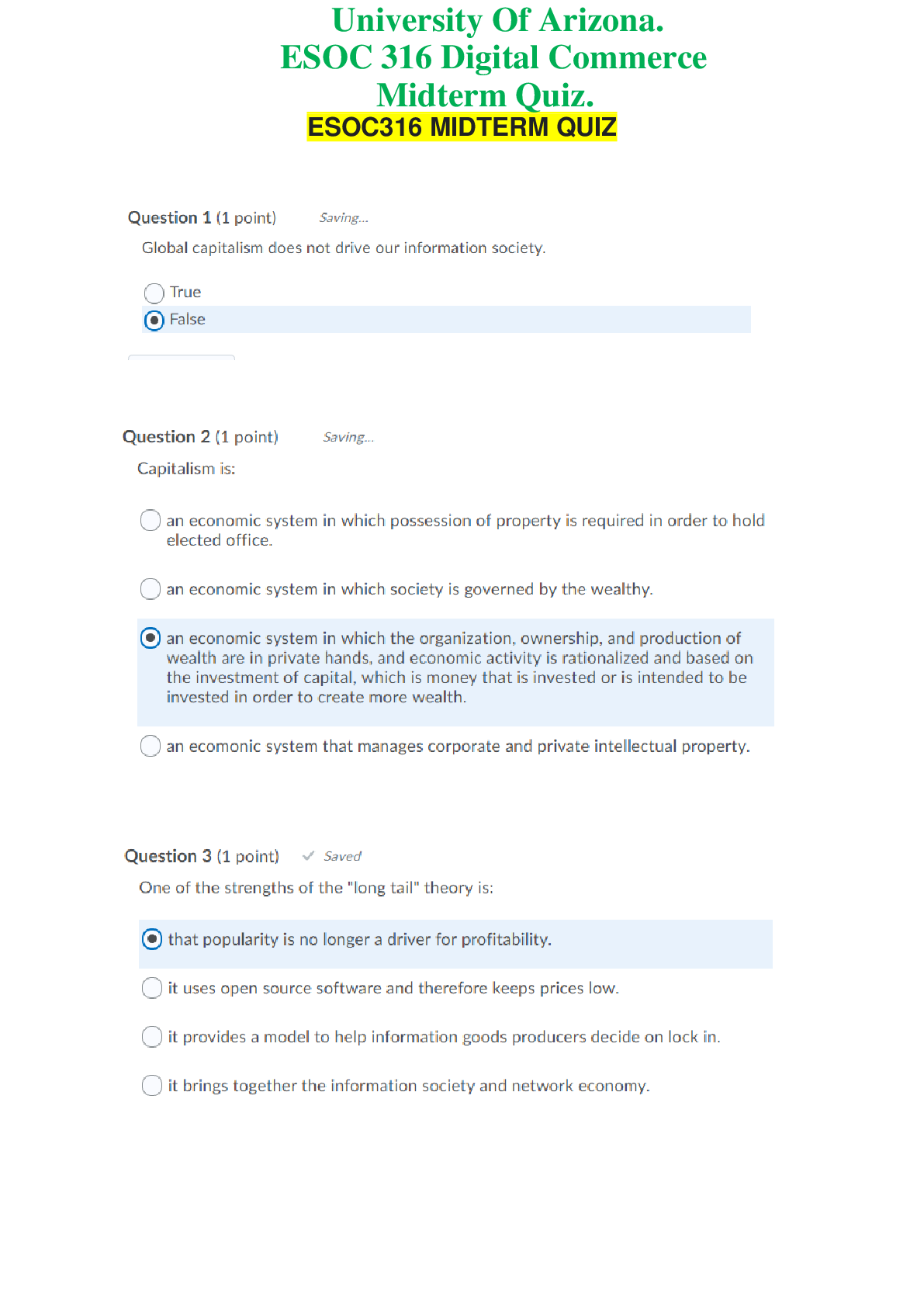
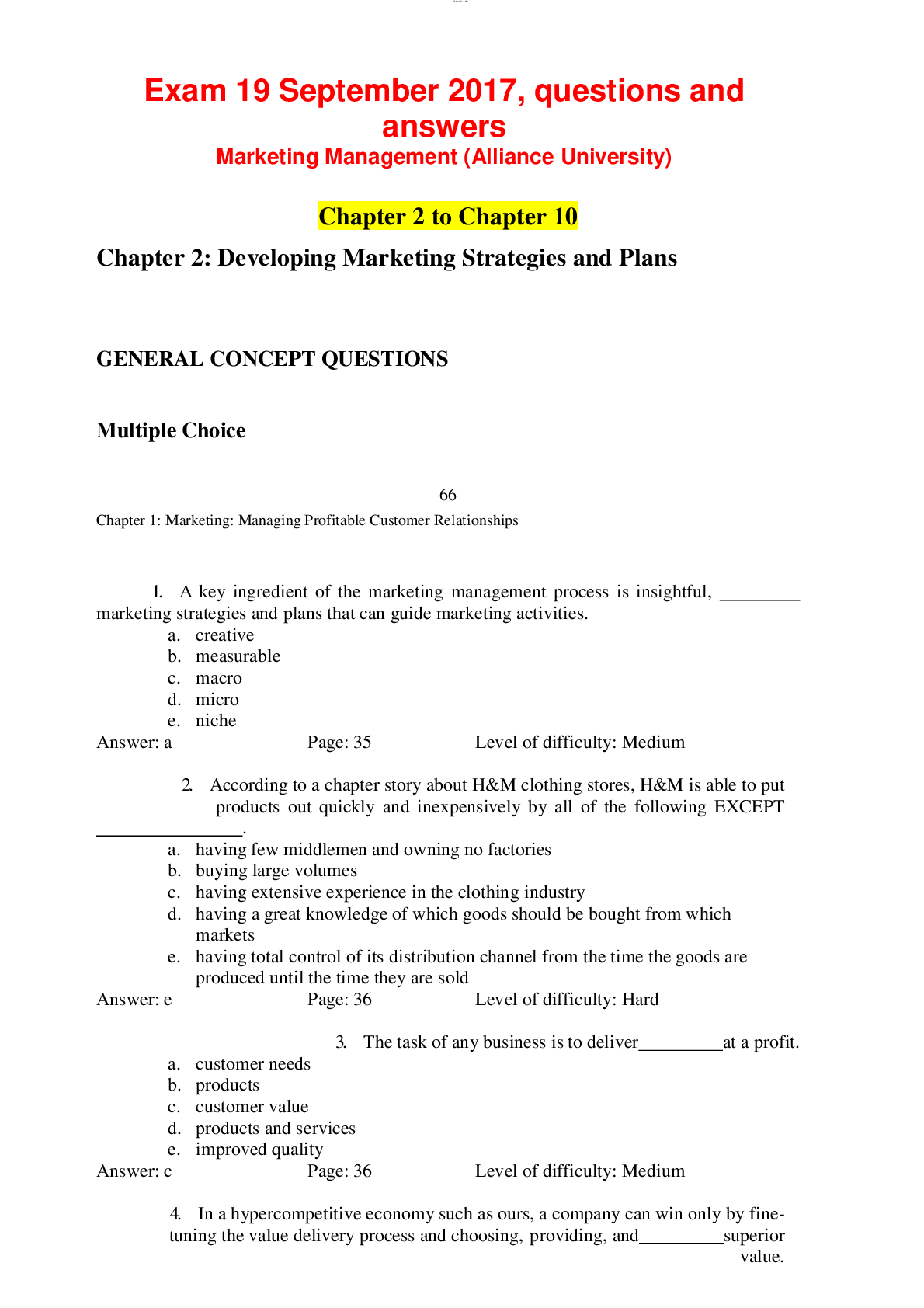
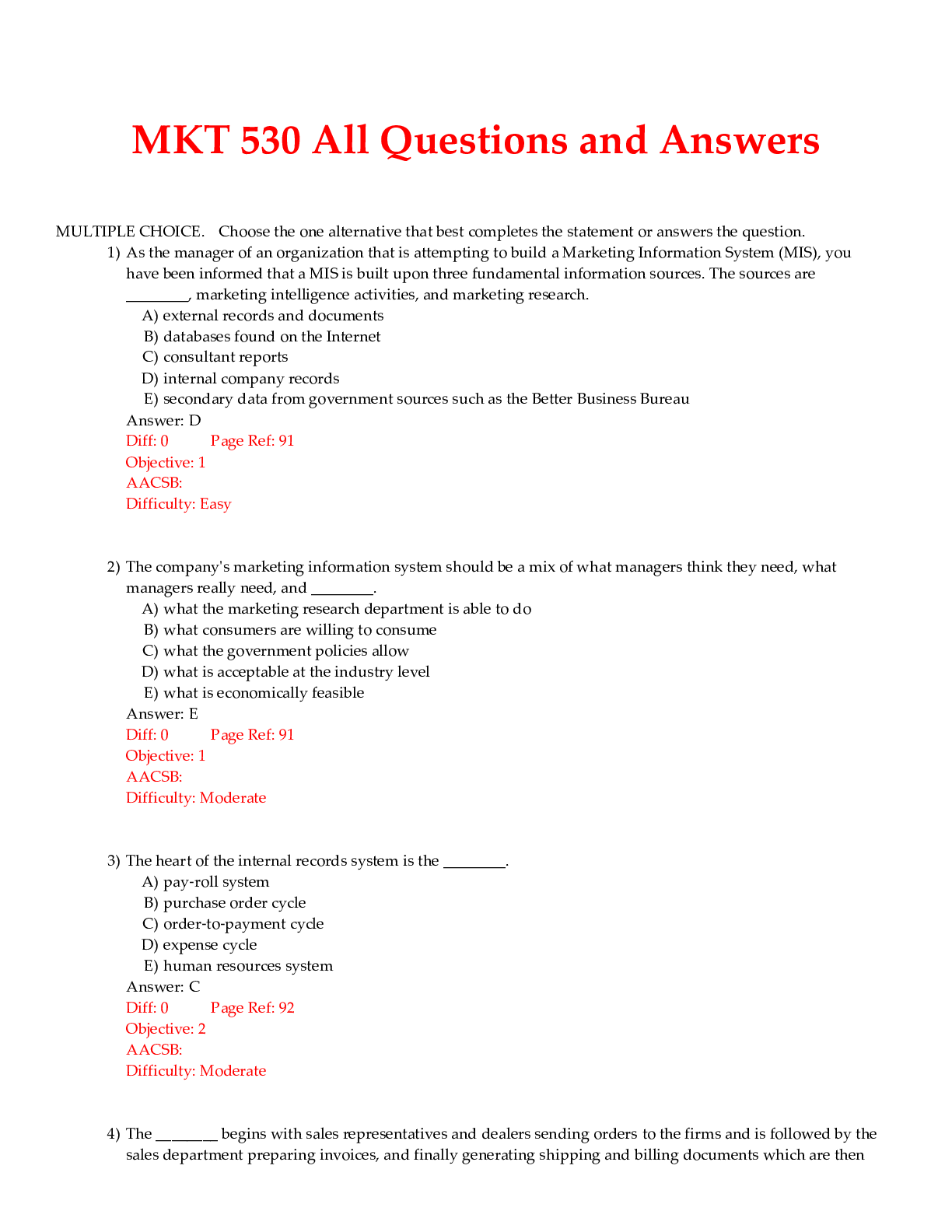
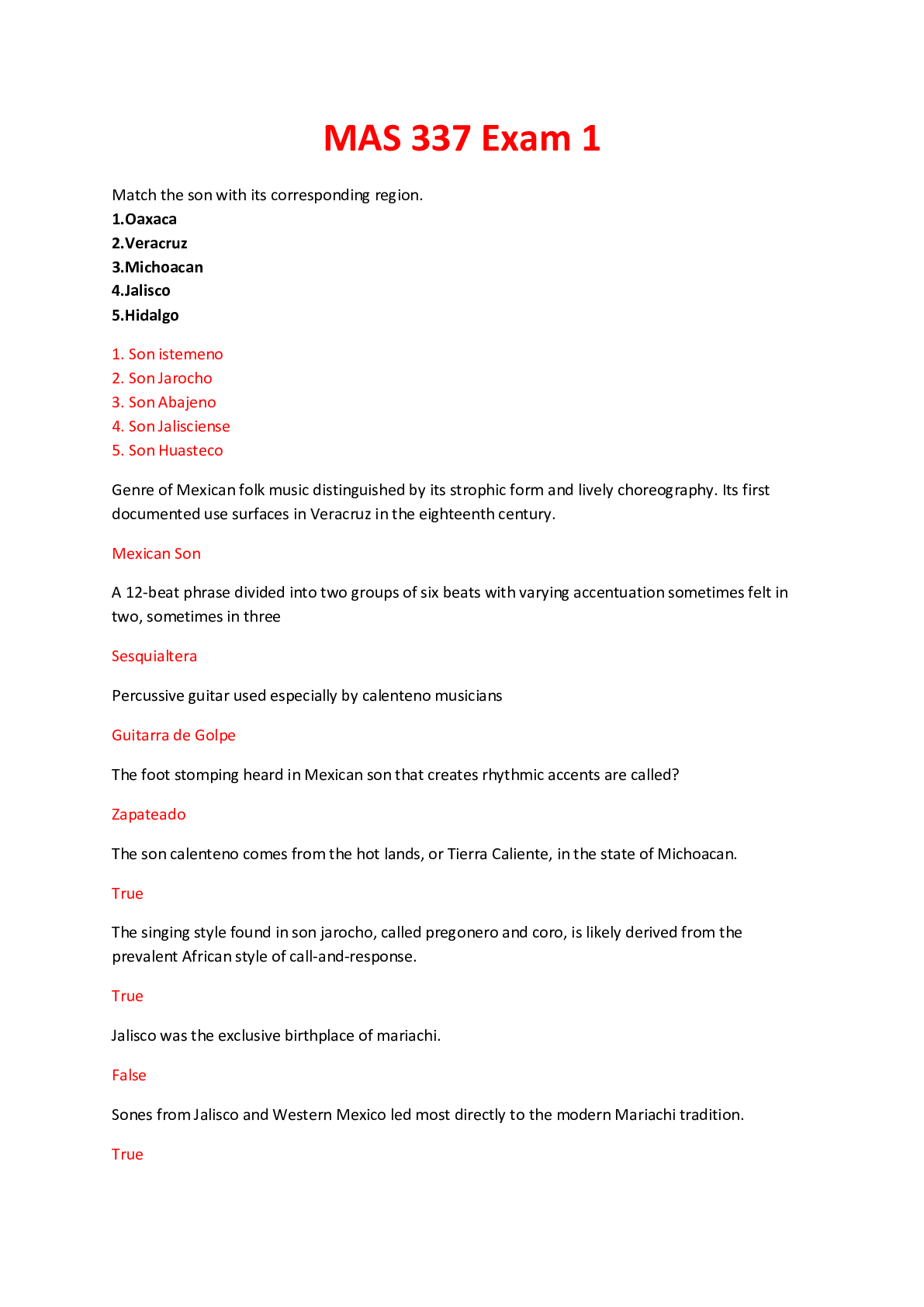
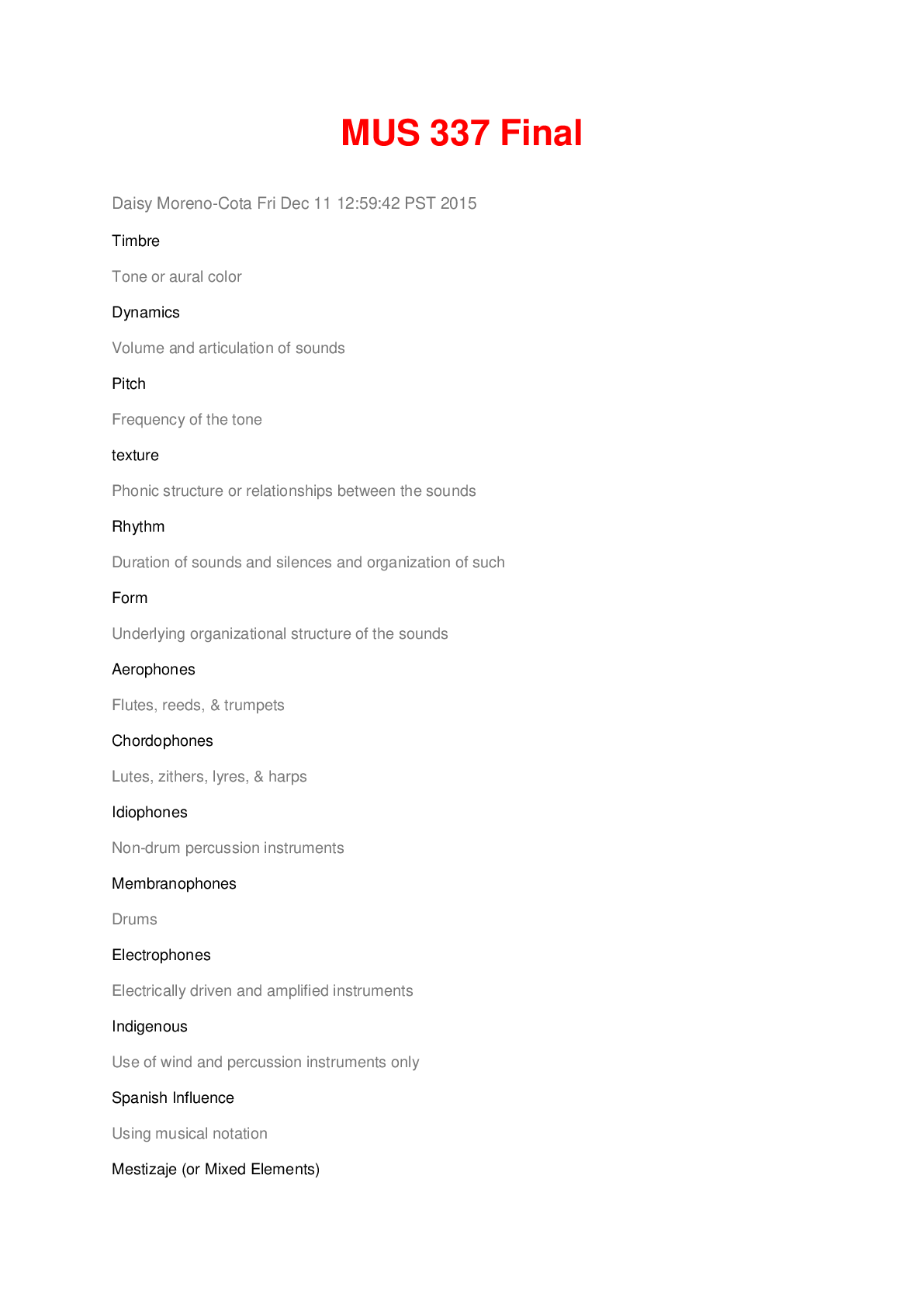
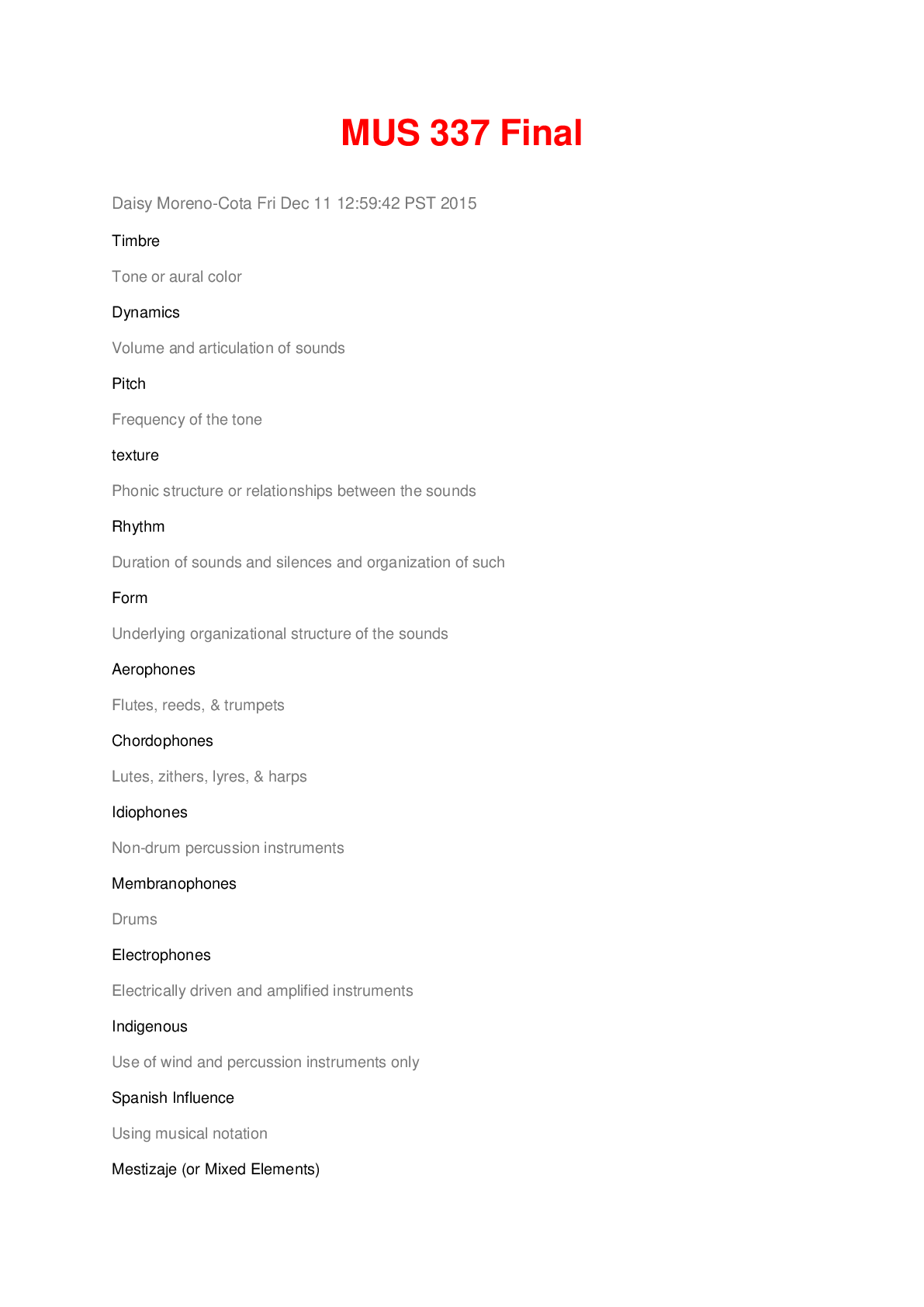
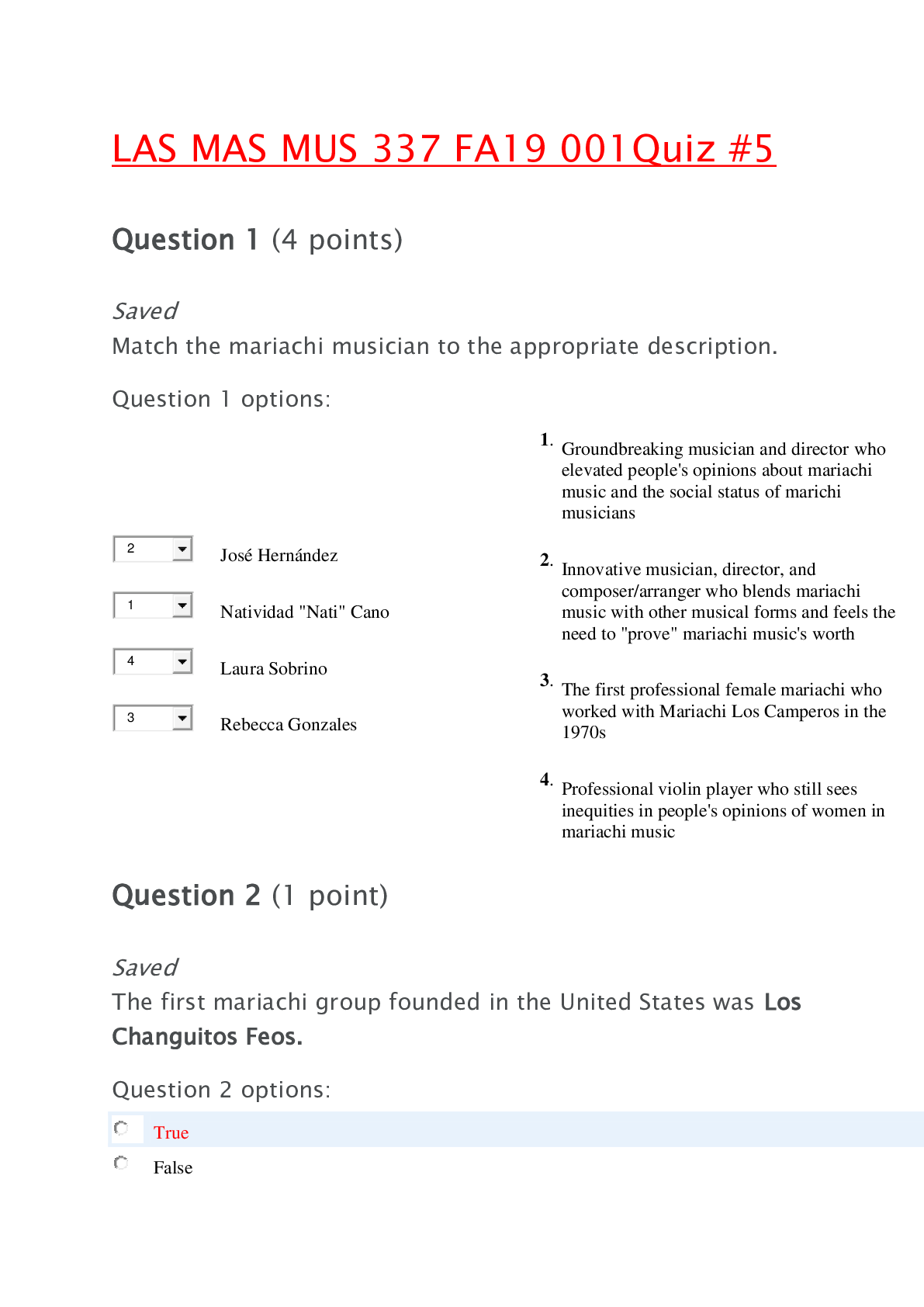
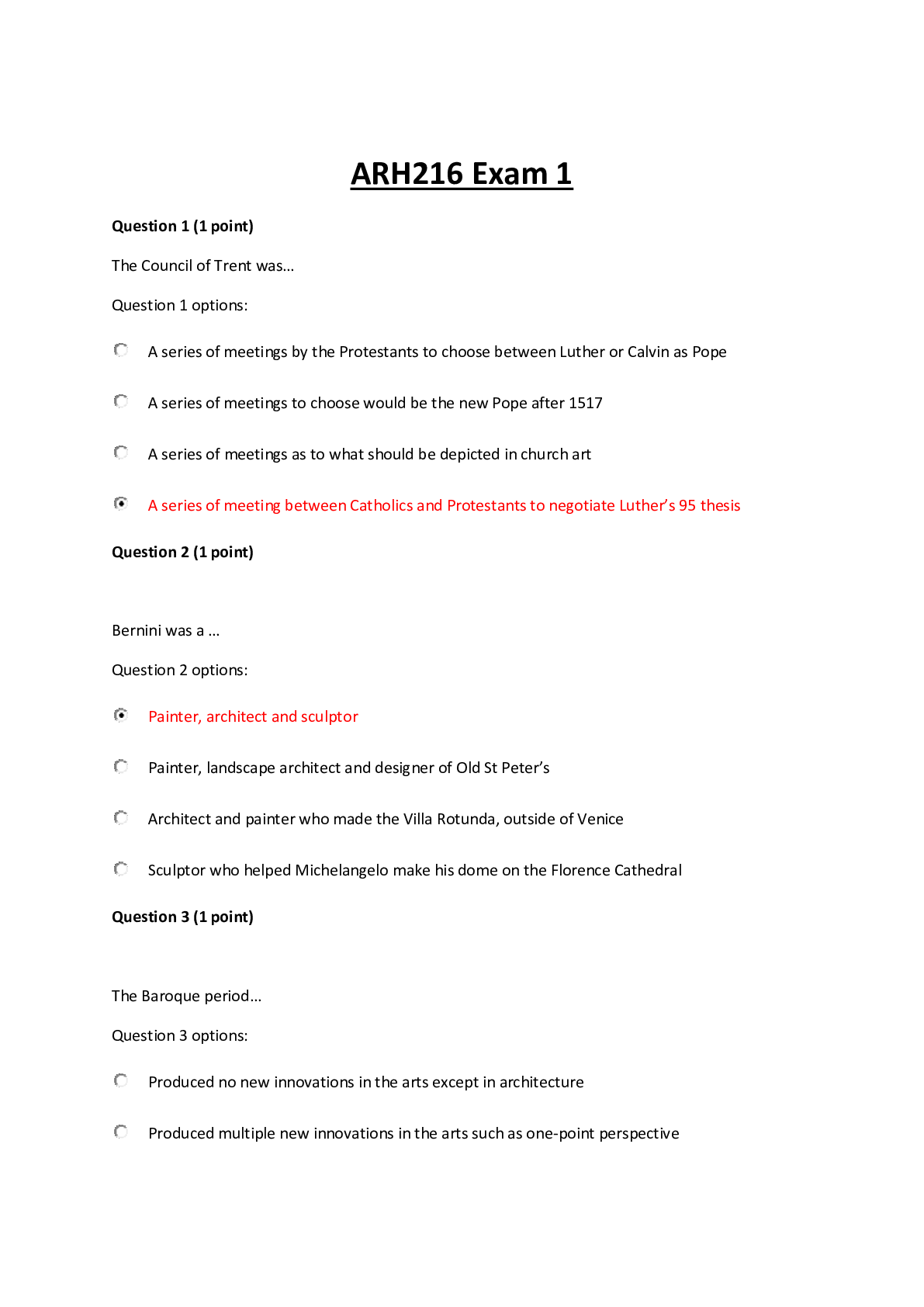
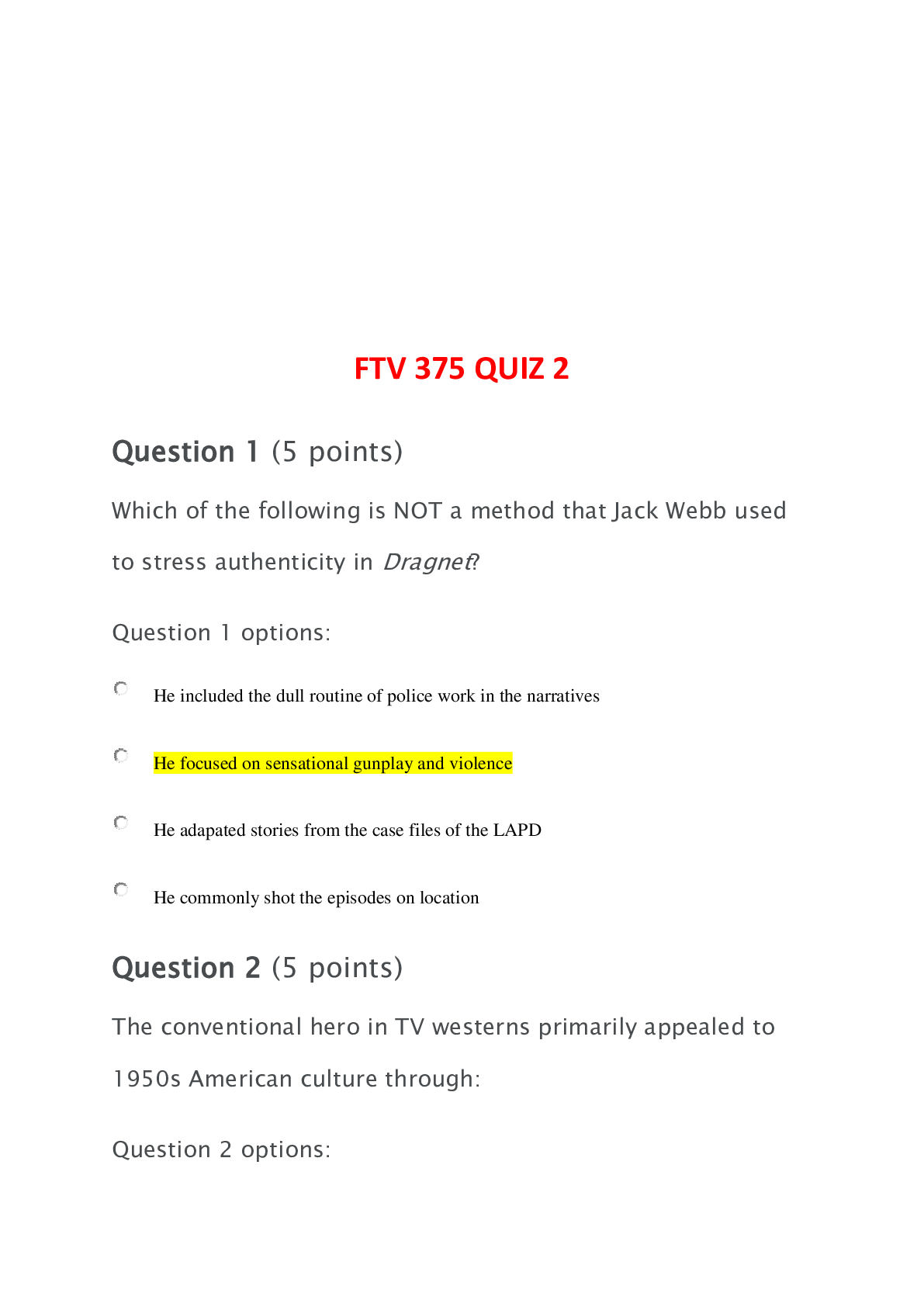
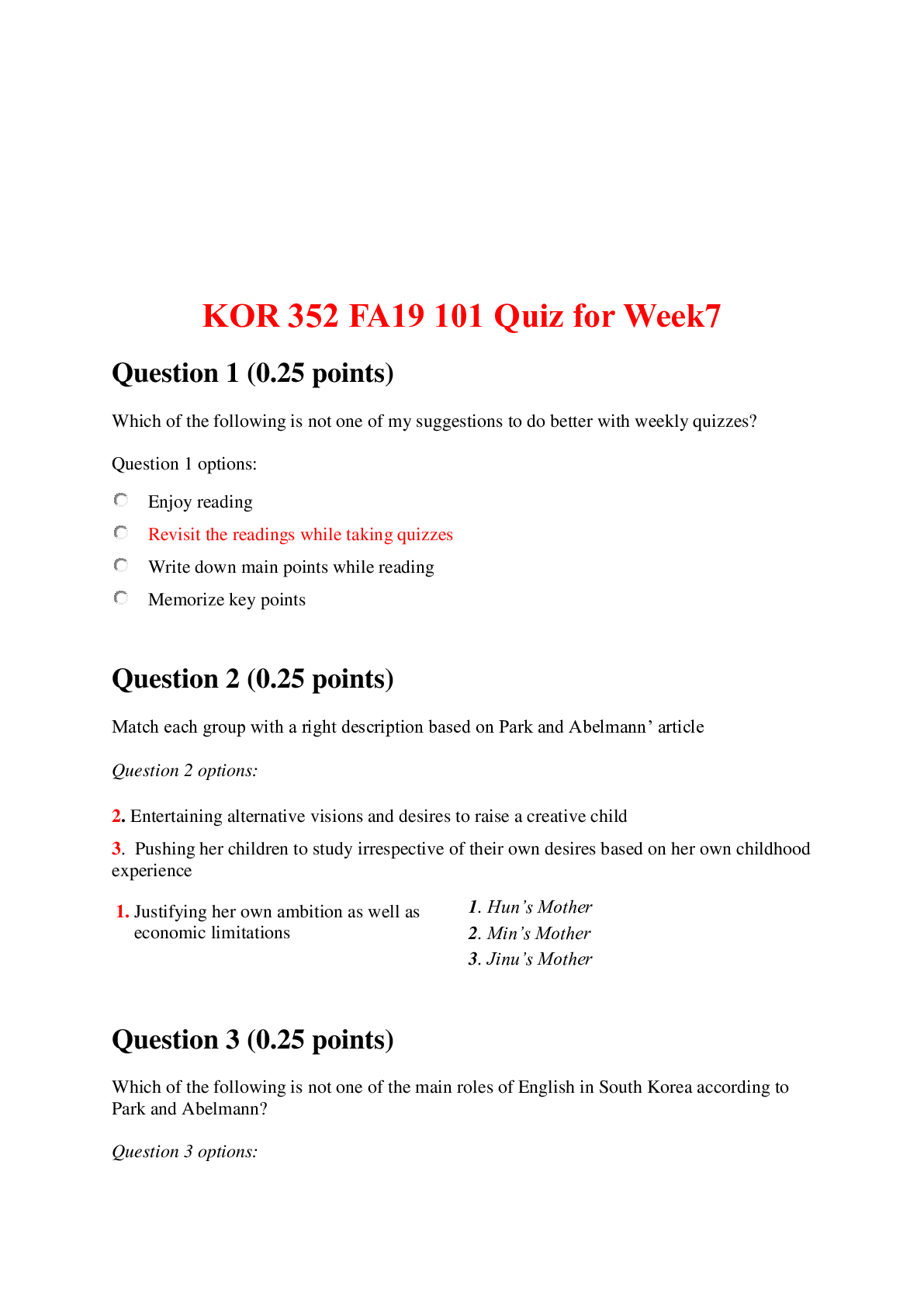
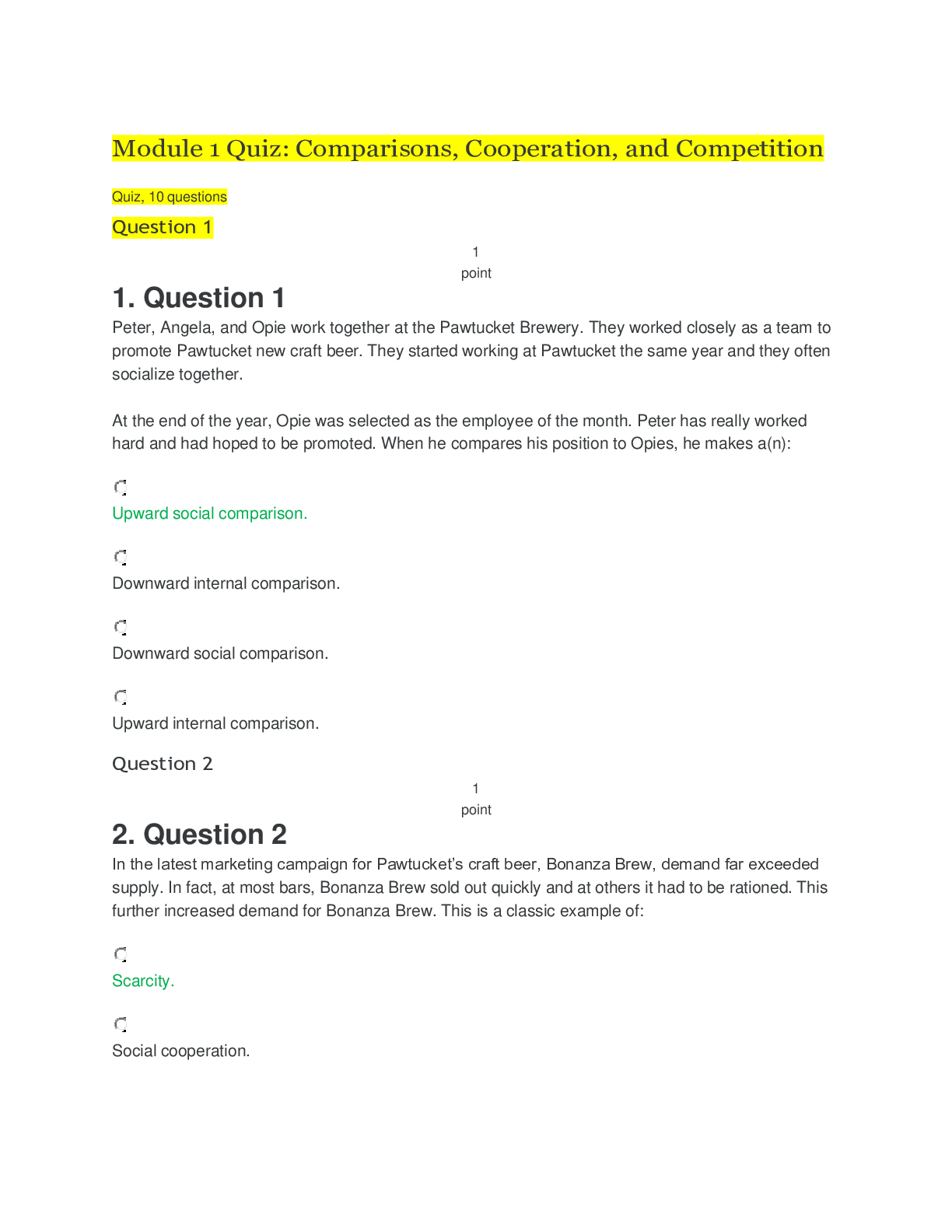
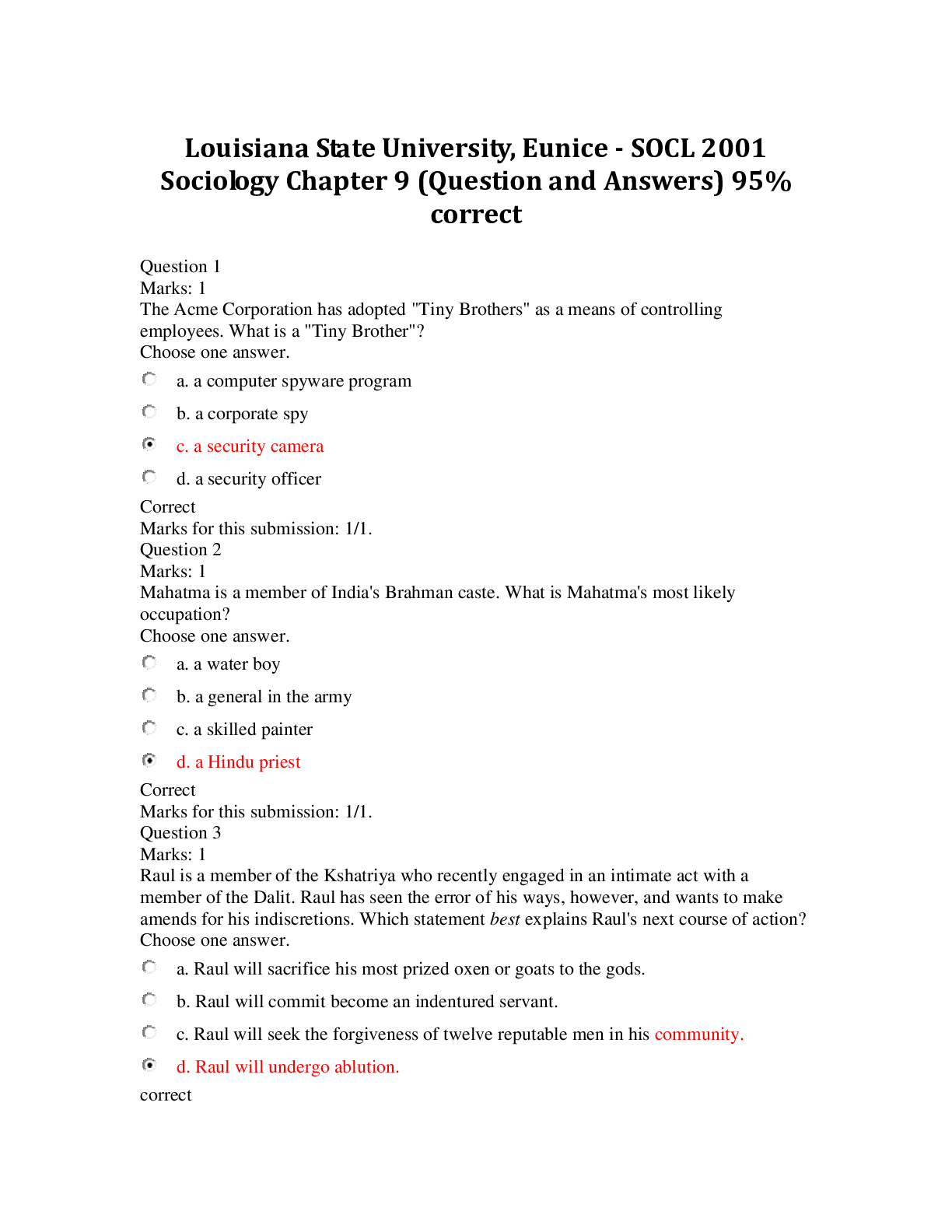
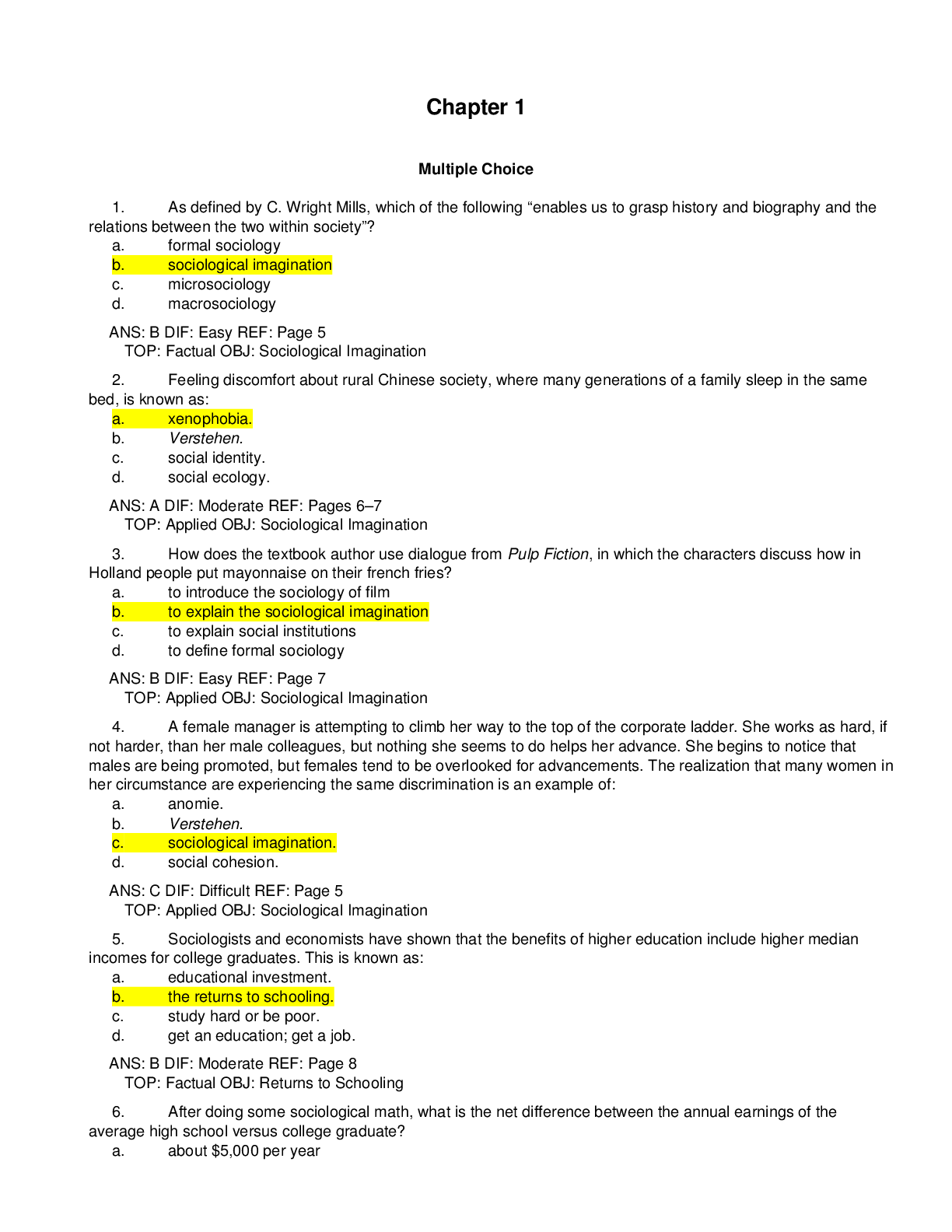
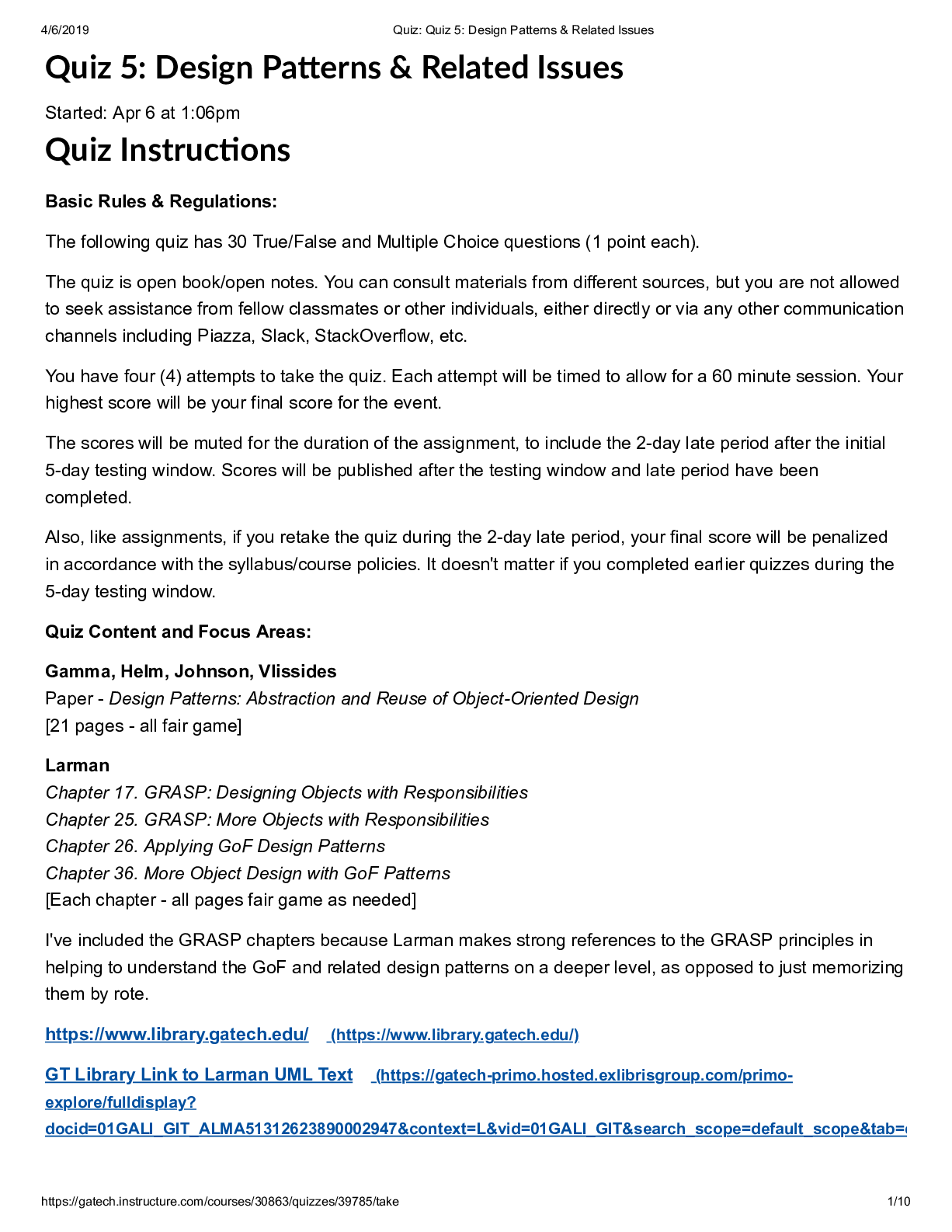
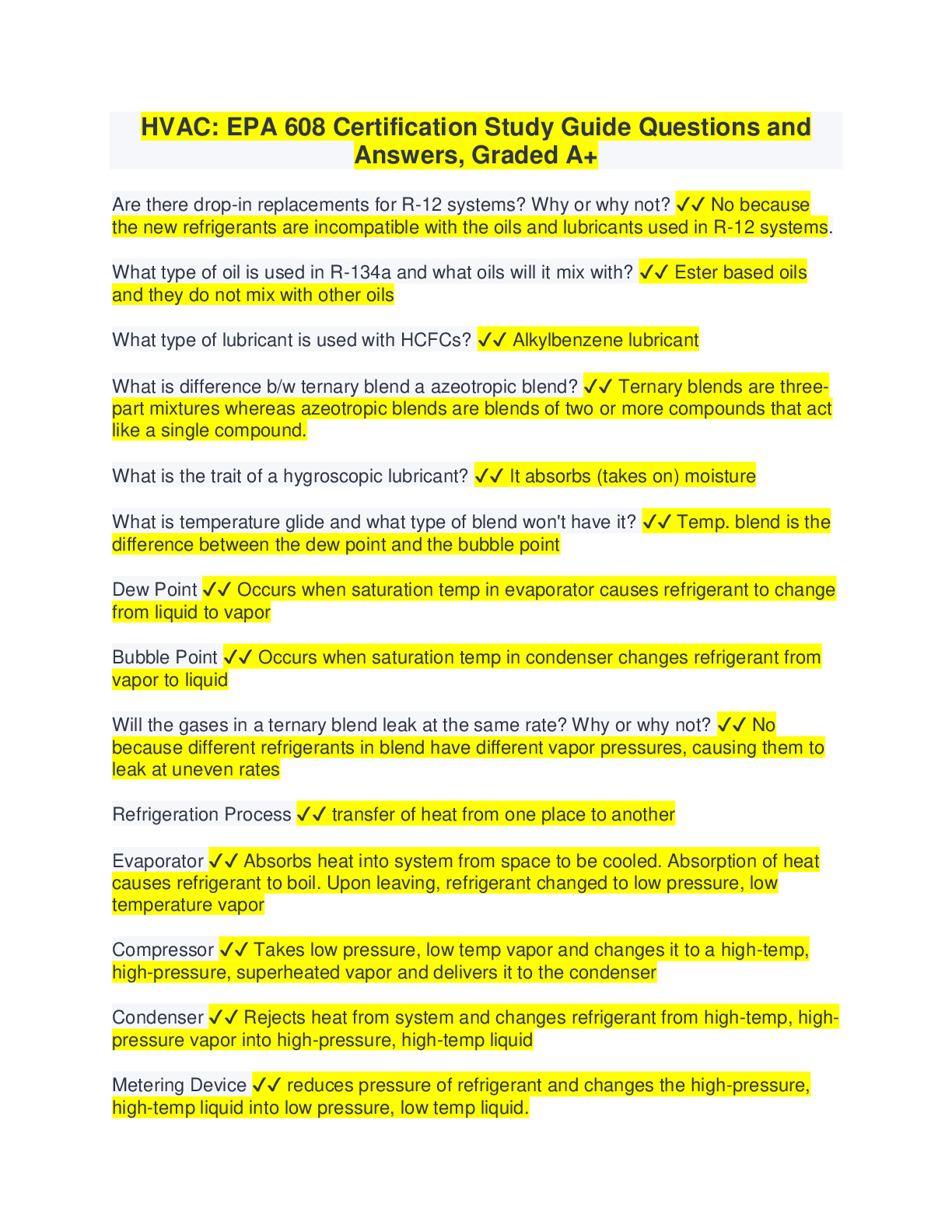
.png)
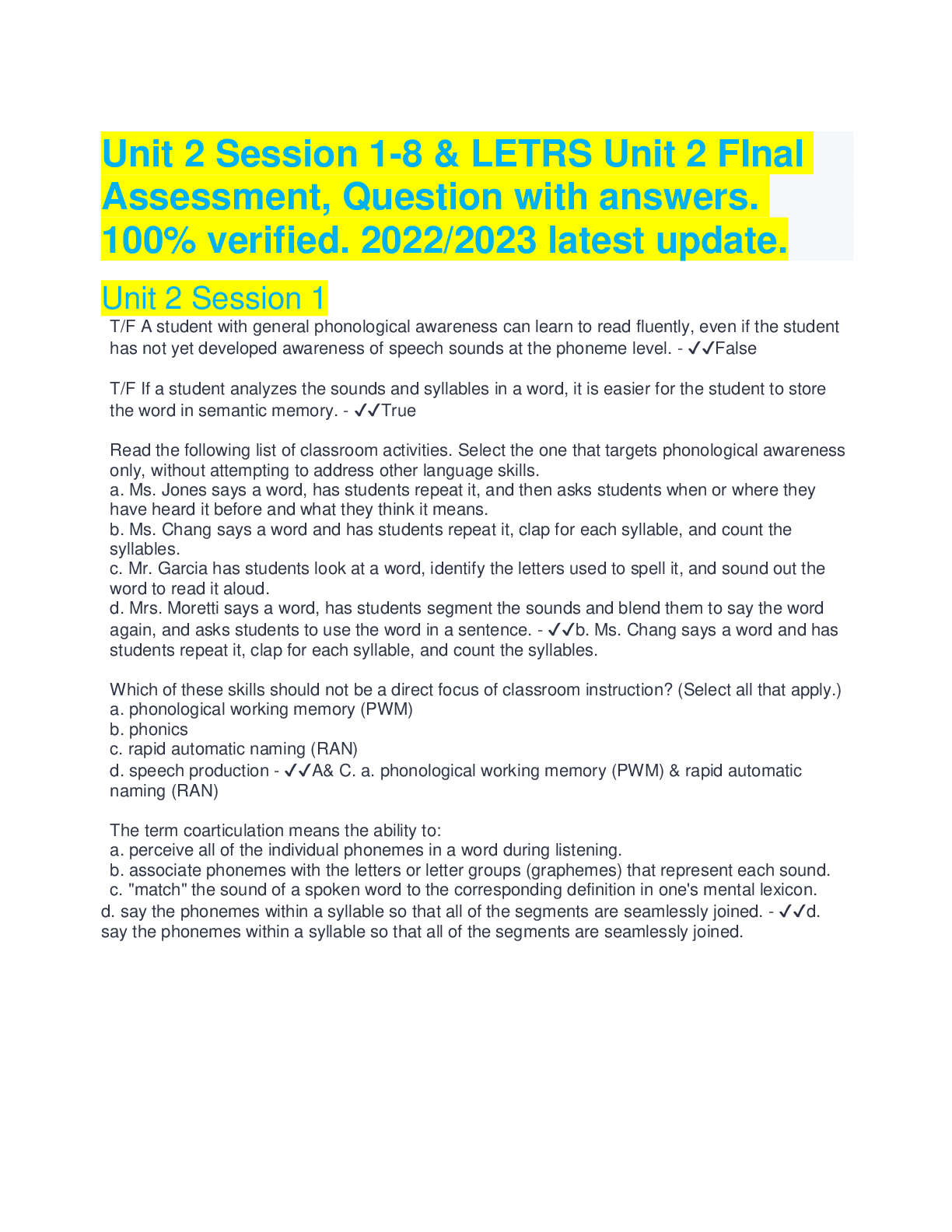
.png)
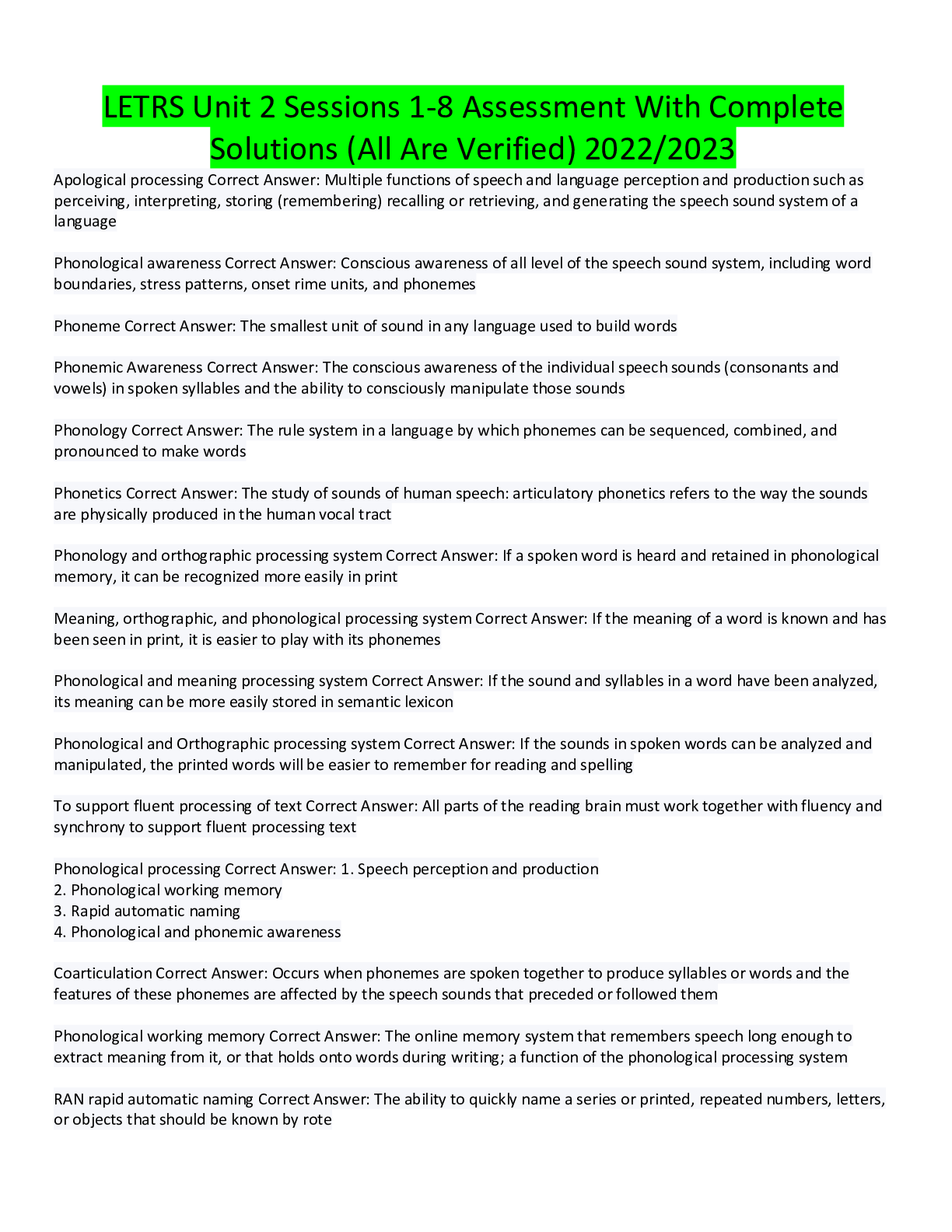
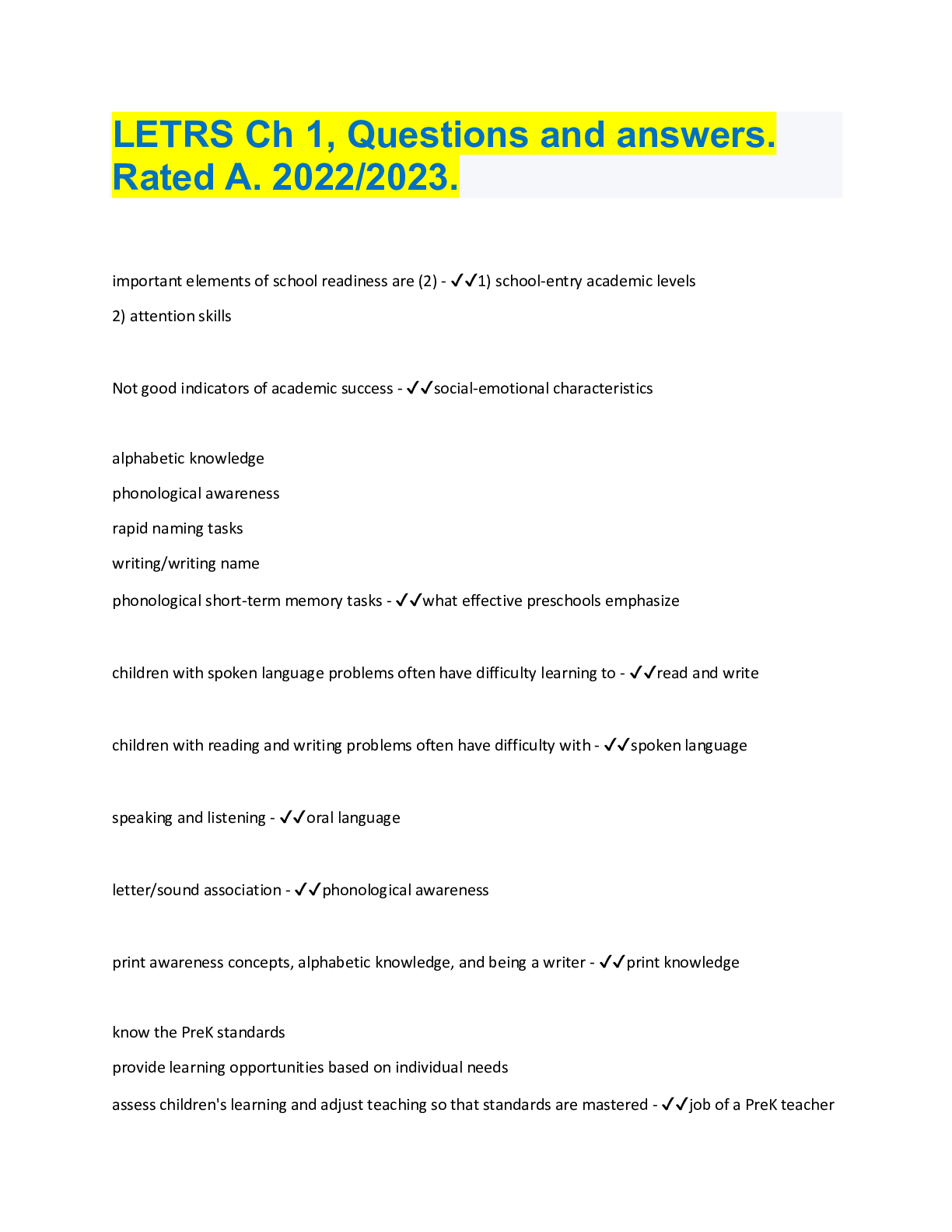
.png)
.png)
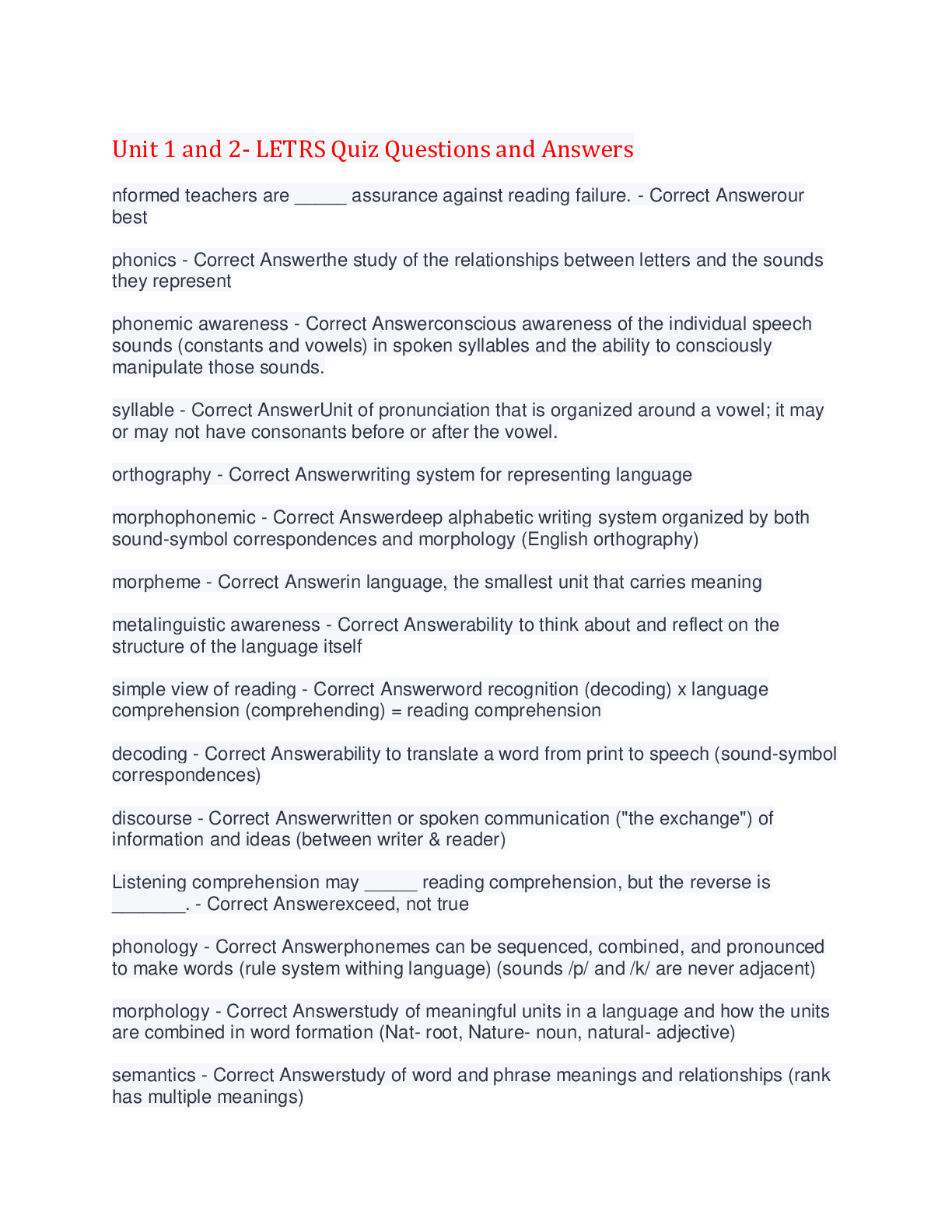
.png)

